概述
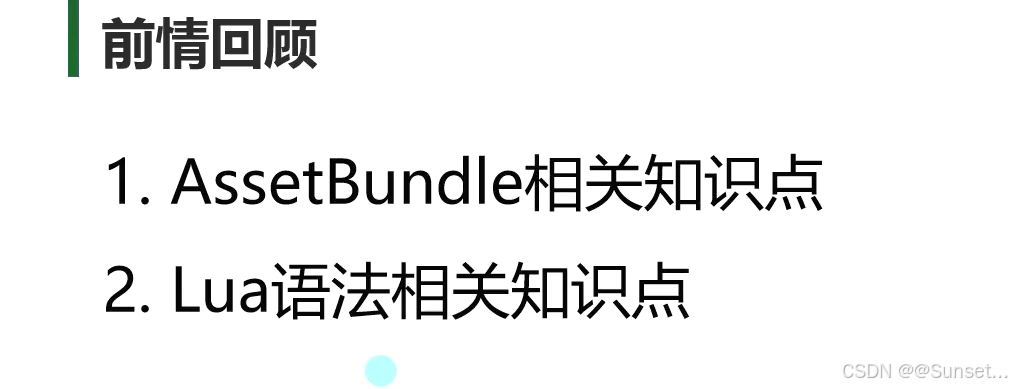
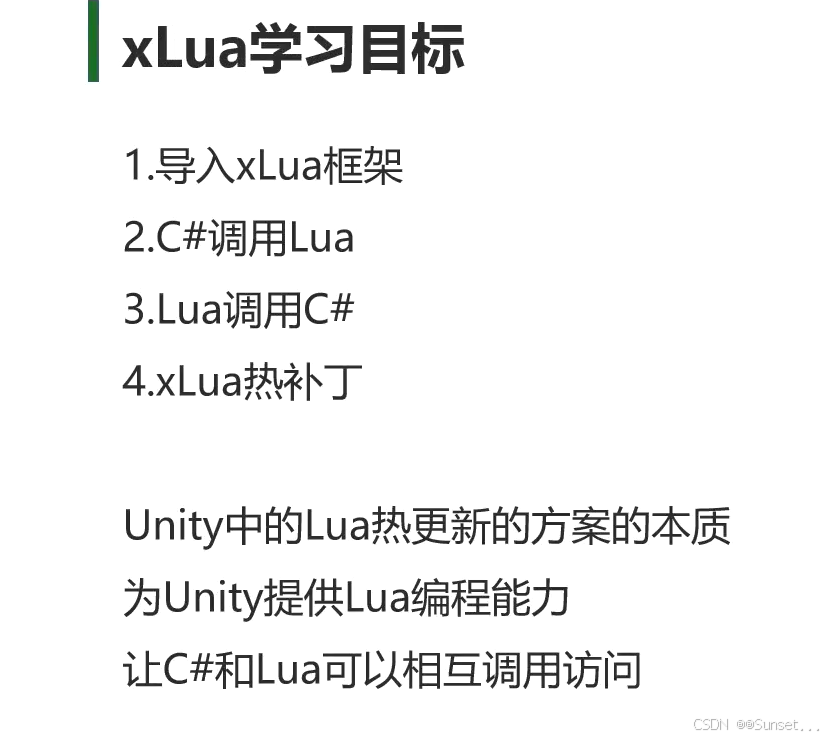
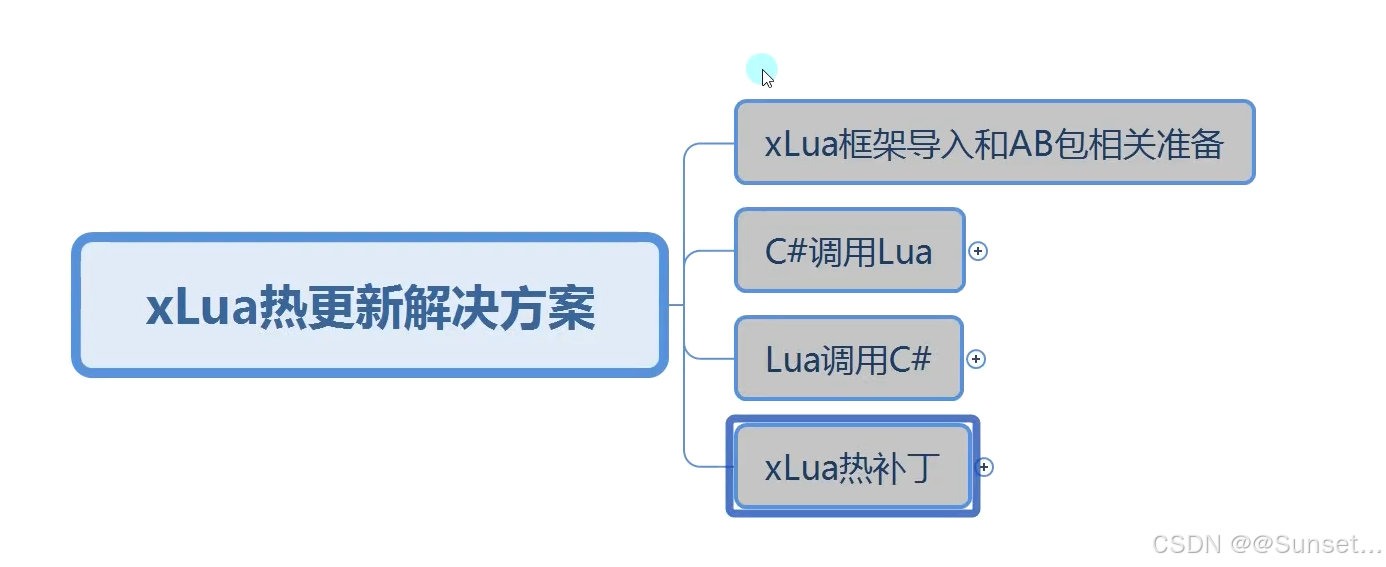
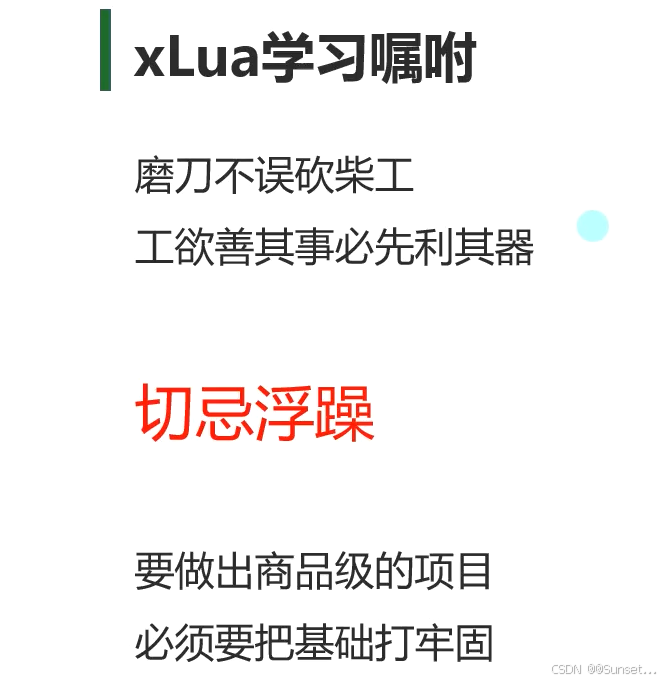
xLua框架导入和AB包相关准备
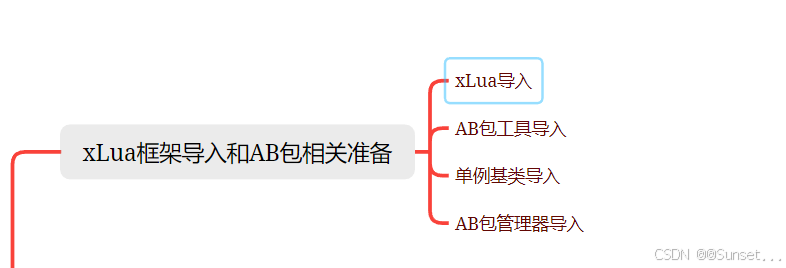
xLua导入

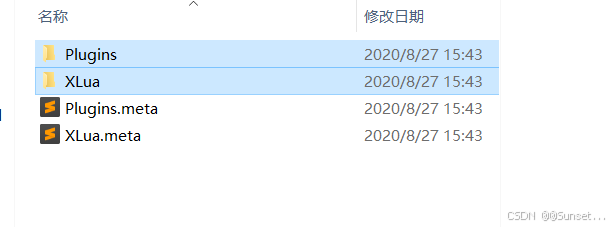
其它的导入
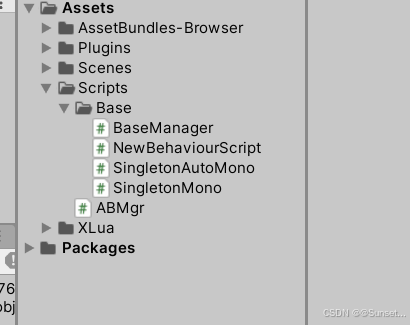
C#调用Lua
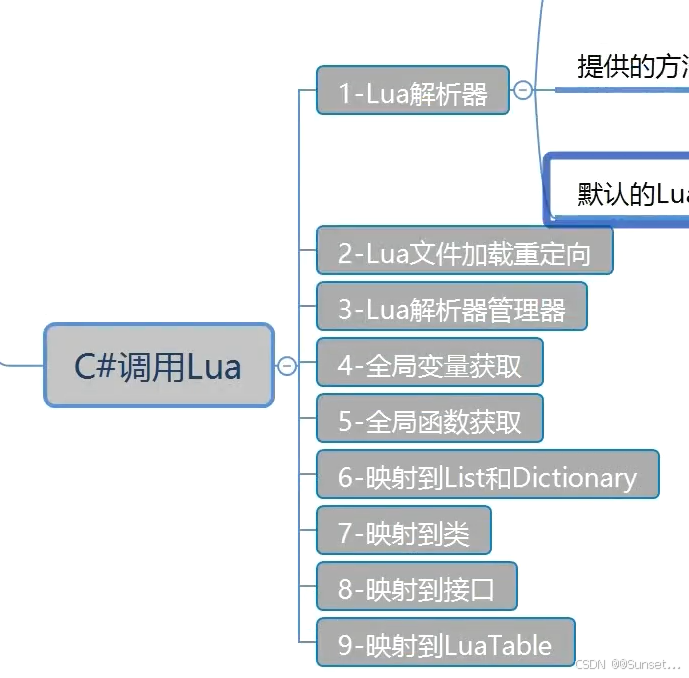
1.Lua解析器
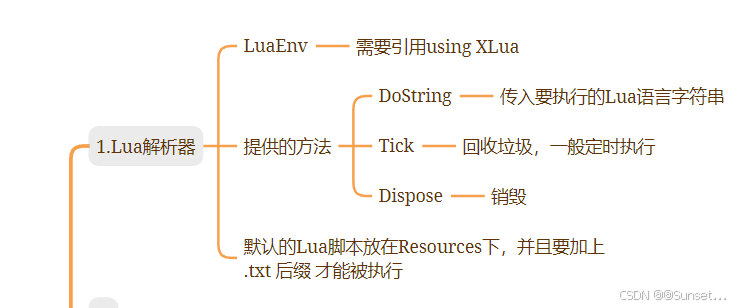
cs
using System.Collections;
using System.Collections.Generic;
using UnityEngine;
//引用命名空间
using XLua;
public class Lesson1_LuaEnv : MonoBehaviour
{
// Start is called before the first frame update
void Start()
{
//Lua解析器 能够让我们在Unity中执行Lua
//一般情况下 保存它的唯一性
LuaEnv env = new LuaEnv();
//执行Lua语言
//第二个参数是 如果lua出错 会打印第二个参数
env.DoString("print('Hello world')", "Lesson1_LuaEnv");
//通常我们会执行一个Lua脚本,将要执行的多行代码放入脚本中(Lua知识点:多脚本执行 require)
//默认寻找脚本的路径 是在 Resources下 并且 因为在这里估计是通过 Resources.Load去加载Lua脚本的
//所以只支持 txt、bytes等文件名后缀,只能在Lua脚本后缀再加上 txt才能执行
env.DoString("require('Main')");
//帮助我们清除Lua中我们没有手动释放的对象 垃圾回收
//帧更新中定时执行 或者 切场景时执行
env.Tick();
//销毁Lua解析器
//通常只会用一个解析器 所以这个函数用的比较少
env.Dispose();
}
// Update is called once per frame
void Update()
{
}
}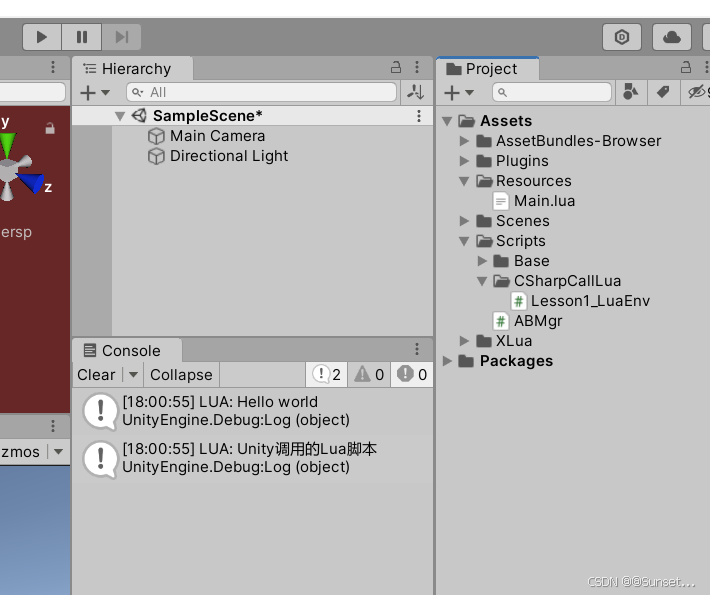
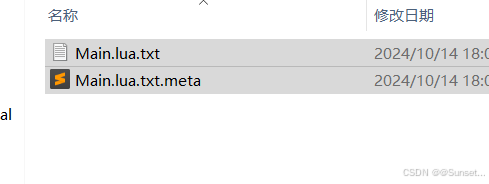
2.Lua文件加载重定向
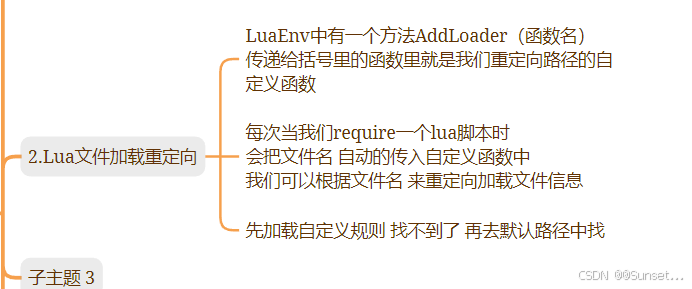
cs
using System.Collections;
using System.Collections.Generic;
using System.IO;
using UnityEngine;
using XLua;
public class Lesson2_Loader : MonoBehaviour
{
// Start is called before the first frame update
void Start()
{
LuaEnv env = new LuaEnv();
//xlua提供的一个 路径重定向 的方法
//允许我们自定义 加载 Lua文件的规则
//当我们执行Lua语言 require 时 相当于执行一个lua脚本
//它就会 执行 我们自定义传入的这个函数
env.AddLoader(MyCustomLoader);
//最终我们其实 会去AB包中加载 lua文件
env.DoString("require('Main')");
env.DoString("require('ttt')"); //测试找不到时 会不会打印我们设置好的错误信息
}
// Update is called once per frame
void Update()
{
}
//自动执行
private byte[] MyCustomLoader(ref string filePath)
{
//通过函数中的逻辑 去加载 Lua文件
//传入的参数是 require执行的lua脚本文件名
//拼接一个lua文件所在路径
string path = Application.dataPath + "/Lua/" + filePath + ".lua";
Debug.Log(path);
//有路径 就去加载文件
//File 知识点 C#提供的文件读写的类
//判断文件是否存在
if (File.Exists(path))
{
return File.ReadAllBytes(path); //这个方法会将文件中的数据转为二进制数组
}
return null;
}
}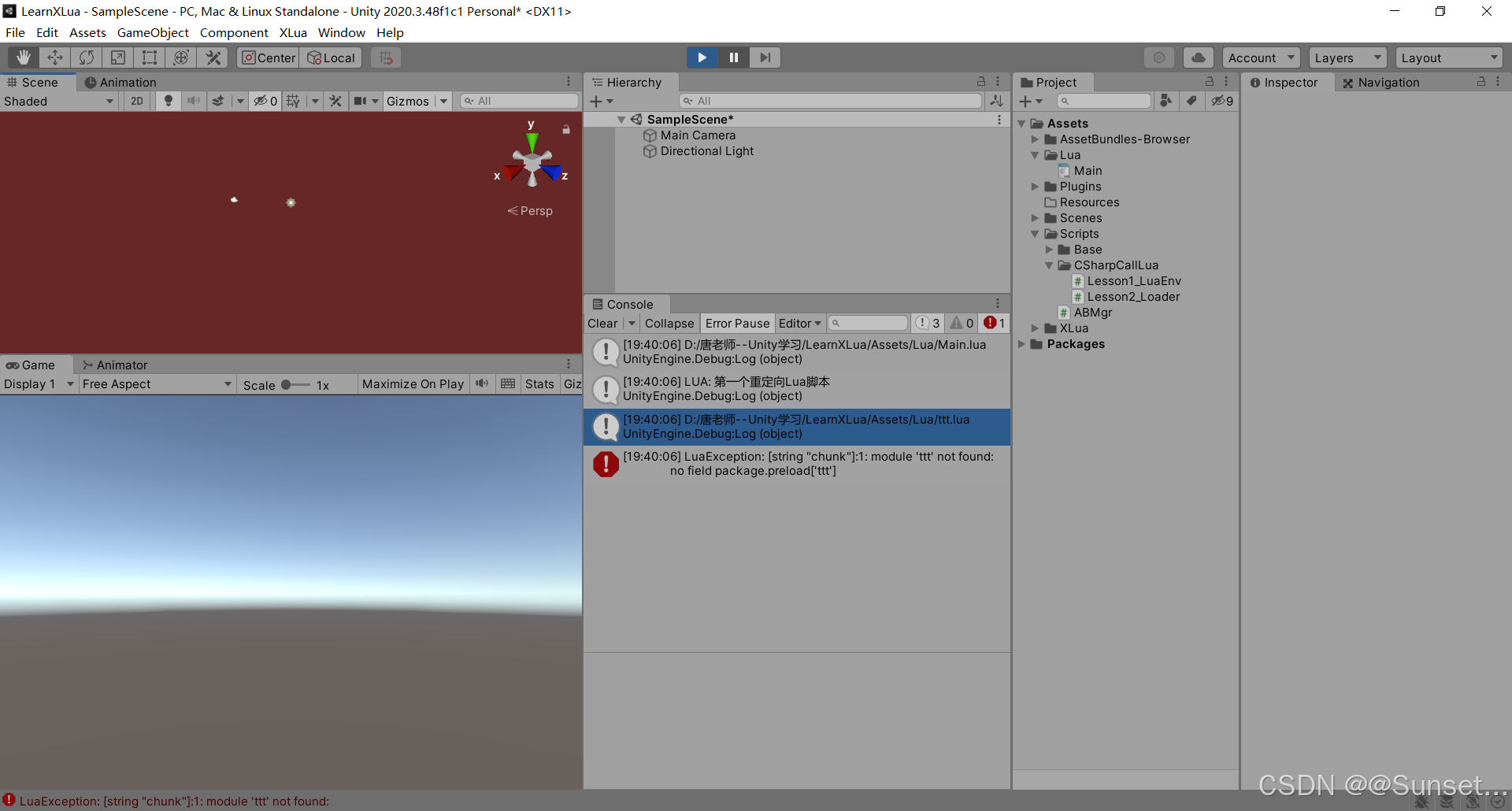
3.Lua解析器管理器
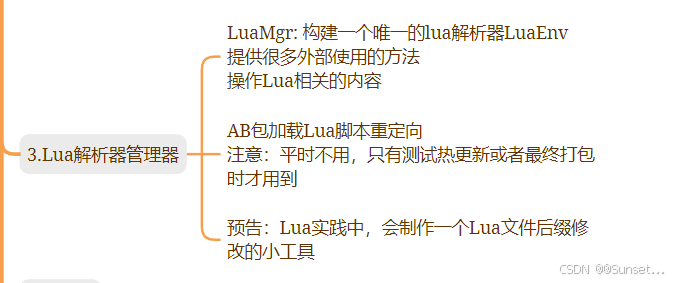
cs
using System.Collections;
using System.Collections.Generic;
using System.IO;
using UnityEngine;
using XLua;
/// <summary>
/// Lua管理器
/// 提供 lua解析器
/// 保证解析器的唯一性
/// </summary>
public class LuaMgr : BaseManager<LuaMgr>
{
//执行Lua语言的函数
//释放垃圾
//销毁
//重定向
private LuaEnv luaEnv;
/// <summary>
/// 得到Lua 中的_G 后面会频繁使用到
/// </summary>
public LuaTable Global
{
get
{
return luaEnv.Global;
}
}
/// <summary>
/// 初始化解析器
/// </summary>
public void Init()
{
//若已经初始化了 就直接return
if (luaEnv != null)
return;
//初始化
luaEnv = new LuaEnv();
//加载lua脚本 重定向
luaEnv.AddLoader(MyCustomLoader);
luaEnv.AddLoader(MyCustomABLoader); // 会依次执行
}
//Lua脚本会放在AB包
//最终我们会通过加载AB包再加载其中的Lua脚本资源 来执行它
//AB包中如果加载文本 后缀还是有一定限制的 .lua还是不能被识别
//打包时 要把lua文件后缀改为 txt
//自动执行
private byte[] MyCustomLoader(ref string filePath)
{
//通过函数中的逻辑 去加载 Lua文件
//传入的参数 是 require 执行的lua脚本文件名
//拼接一个Lua文件所在路径
string path = Application.dataPath + "/Lua/" + filePath + ".lua";
//有路径 就去加载文件
//File知识点 C#提供的文件读写的类
//判断文件是否存在
if (File.Exists(path))
return File.ReadAllBytes(path);
else
Debug.Log("MyCustomLoader重定向失败,文件名为:" + filePath);
return null;
}
//重定向加载AB包的Lua脚本
private byte[] MyCustomABLoader(ref string filePath)
{
//Debug.Log("进入AB包加载 重定向函数");
从AB包中加载lua文件
加载AB包
//string path = Application.streamingAssetsPath + "/lua";
//AssetBundle ab = AssetBundle.LoadFromFile(path);
加载Lua文件 返回
//TextAsset tx = ab.LoadAsset<TextAsset>(filePath + ".lua"); //改变了文件名所以.lua也是文件名的一部分
加载Lua文件 byte数组
//return tx.bytes;
string path = Application.streamingAssetsPath + "/lua";
TextAsset lua = ABMgr.GetInstance().LoadRes<TextAsset>("lua", filePath + ".lua");
if (lua != null)
return lua.bytes;
else
Debug.Log("MyCustomABLoader重定向失败,文件名为:" + filePath);
return null;
}
/// <summary>
/// 传入lua文件名 就可以执行luo脚本 (就是DoString 的优化)
/// </summary>
/// <param name="fileName"></param>
public void DoLuaFile(string fileName)
{
string str = string.Format("require('{0}')", fileName);
DoString(str);
}
/// <summary>
/// 执行Lua语言
/// </summary>
/// <param name="str"></param>
public void DoString(string str)
{
if(luaEnv == null)
{
Debug.Log("解析器未初始化");
return;
}
luaEnv.DoString(str);
}
/// <summary>
/// 释放资源
/// </summary>
public void Tick()
{
if (luaEnv == null)
{
Debug.Log("解析器未初始化");
return;
}
luaEnv.Tick();
}
/// <summary>
/// 销毁解析器
/// </summary>
public void Dispose()
{
if (luaEnv == null)
{
Debug.Log("解析器未初始化");
return;
}
luaEnv.Dispose();
luaEnv = null;
}
}测试
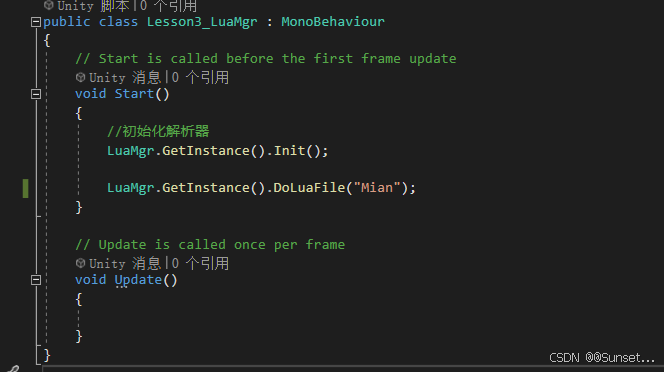
4.全局变量获取
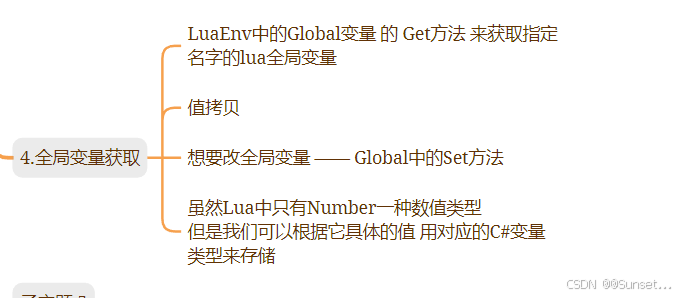
cs
using System.Collections;
using System.Collections.Generic;
using UnityEngine;
public class Lesson4_CallVariable : MonoBehaviour
{
// Start is called before the first frame update
void Start()
{
LuaMgr.GetInstance().Init();
LuaMgr.GetInstance().DoLuaFile("Main");
//我们通过C# 没办法直接获取本地局部变量
int local = LuaMgr.GetInstance().Global.Get<int>("testLocal");
Debug.Log("testLocal:" + local);
//使用lua解析器luaenv中的 Global属性
int i = LuaMgr.GetInstance().Global.Get<int>("testNumber");
Debug.Log("testNumber:" + i);
i = 10;
//值copy 不会影响原来Lua中的值
int i2 = LuaMgr.GetInstance().Global.Get<int>("testNumber");
Debug.Log("testNumber:" + i2);
//改值
LuaMgr.GetInstance().Global.Set("testNumber", 55);
i2 = LuaMgr.GetInstance().Global.Get<int>("testNumber");
Debug.Log("testNumber:" + i2);
bool b = LuaMgr.GetInstance().Global.Get<bool>("testBool");
Debug.Log("testBool:" + b);
float f = LuaMgr.GetInstance().Global.Get<float>("testFloat");
Debug.Log("testFloat:" + f);
double d = LuaMgr.GetInstance().Global.Get<double>("testFloat");
Debug.Log("testFloat_Double:" + d);
string str = LuaMgr.GetInstance().Global.Get<string>("testString");
Debug.Log("testString:" + str);
}
// Update is called once per frame
void Update()
{
}
}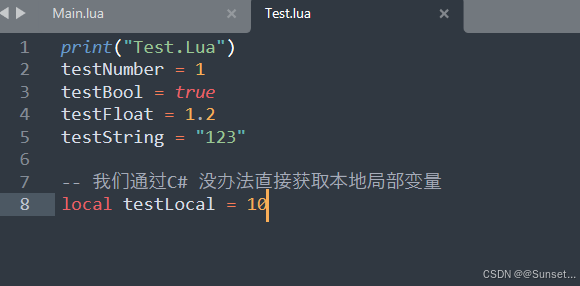
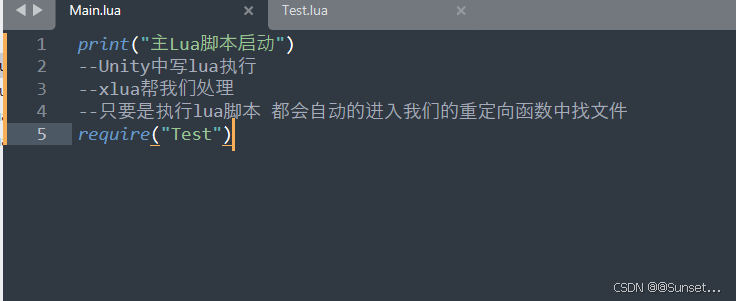
5.全局函数获取
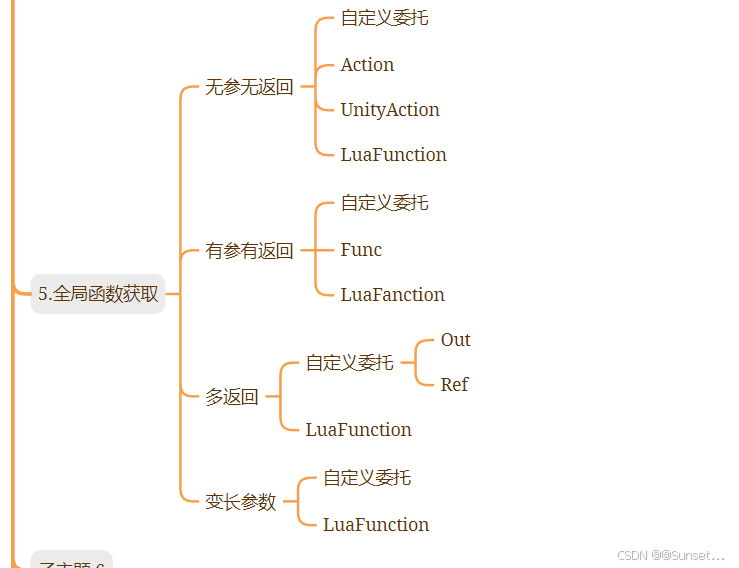
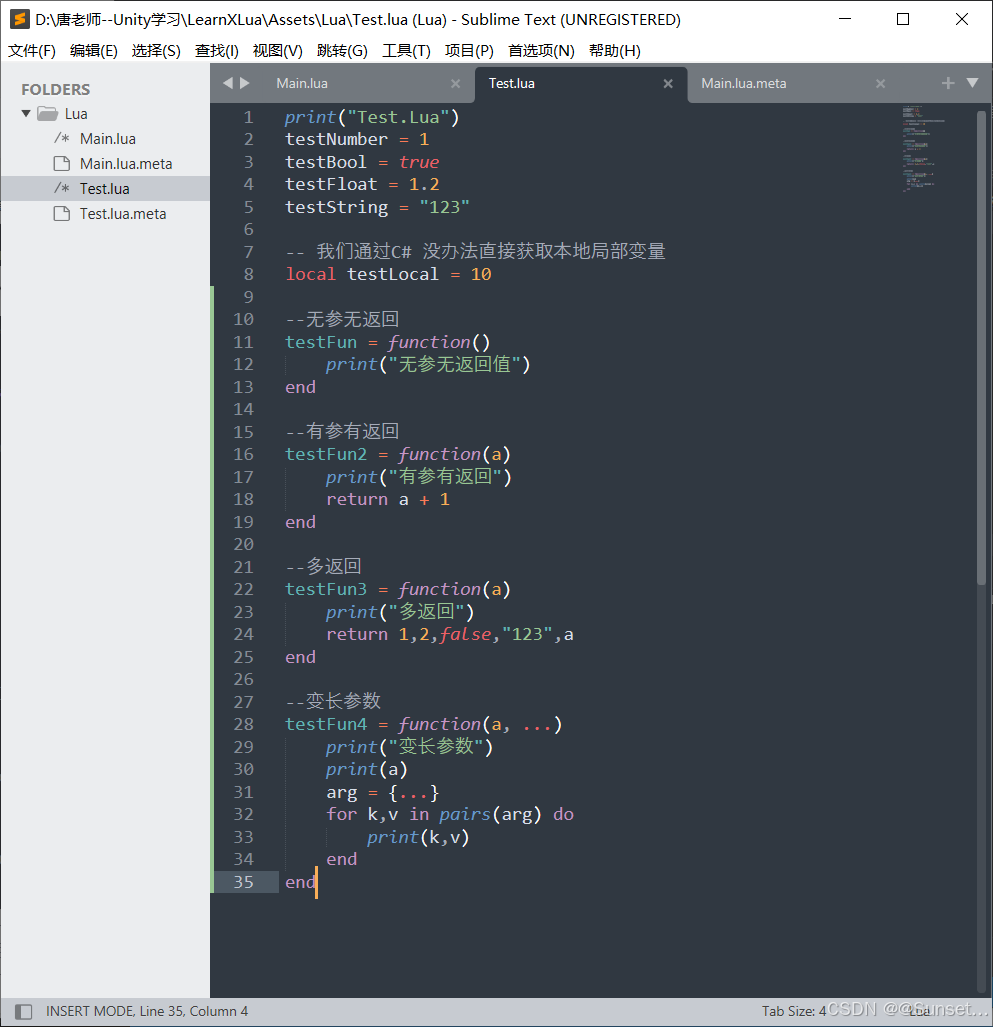
cs
using System;
using System.Collections;
using System.Collections.Generic;
using UnityEngine;
using UnityEngine.Events;
using XLua;
public class Lesson5_CollFunction : MonoBehaviour
{
//无参无返回值的委托
public delegate void CustomCall();
//有参有返回的委托
//该特性是在XLua命名空间中的
//加了过后 要在编辑器里 生成 Lua代码
[CSharpCallLua]
public delegate int CustomCall2(int a);
//多返回值委托
[CSharpCallLua]
public delegate int CustomCall3(int a, out int b, out bool c, out string d, out int e);
[CSharpCallLua]
public delegate int CustomCall4(int a, ref int b, ref bool c, ref string d, ref int e);
//变长参数委托
//变长参数的类型 是根据实际情况来定的 如果想要什么类型都接就传 obj
[CSharpCallLua]
public delegate void CustomCall5(string a, params int[] args);
// Start is called before the first frame update
void Start()
{
LuaMgr.GetInstance().Init();
LuaMgr.GetInstance().DoLuaFile("Main");
//无参无返回的获取
//用什么来接收他们呢 ------ 委托最合适
CustomCall call = LuaMgr.GetInstance().Global.Get<CustomCall>("testFun");
call();
//Unity自带委托
UnityAction ua = LuaMgr.GetInstance().Global.Get<UnityAction>("testFun");
ua();
//C#提供的委托
Action ac = LuaMgr.GetInstance().Global.Get<Action>("testFun");
ac();
//XLua提供的一种 获取函数的方法 (尽量少用)
LuaFunction lf = LuaMgr.GetInstance().Global.Get<LuaFunction>("testFun");
lf.Call();
//有参有返回
CustomCall2 call2 = LuaMgr.GetInstance().Global.Get<CustomCall2>("testFun2");
Debug.Log("有参有返回:" + call2(10));
//C#自带的泛型委托 (一般情况下我们都不会自己去申明委托,基本上都是有C#或Unity自带的委托)
Func<int, int> sFun = LuaMgr.GetInstance().Global.Get<Func<int, int>>("testFun2");
Debug.Log("有参有返回值:" + sFun(20));
//XLua提供的
LuaFunction lf2 = LuaMgr.GetInstance().Global.Get<LuaFunction>("testFun2");
Debug.Log("有参有返回值:" + lf2.Call(30)[0]);
//多返回值
//使用out 和 ref 来接收 (out外面不需要初始化)
//out
CustomCall3 call3 = LuaMgr.GetInstance().Global.Get<CustomCall3>("testFun3");
int b;
bool c;
string d;
int e;
Debug.Log("第一个返回值:" + call3(100, out b, out c, out d, out e));
Debug.Log(b + "_" + c + "_" + d + "_" + e);
//ref
CustomCall4 call4 = LuaMgr.GetInstance().Global.Get<CustomCall4>("testFun3");
int b1 = 0;
bool c1 = true;
string d1 = "";
int e1 = 0;
Debug.Log("第一个返回值:" + call4(200, ref b1, ref c1, ref d1, ref e1));
Debug.Log(b1 + "_" + c1 + "_" + d1 + "_" + e1);
//XLua (用于多返回值比较适用, 但是会产生垃圾,所以不是很建议使用)
LuaFunction lf3 = LuaMgr.GetInstance().Global.Get<LuaFunction>("testFun3");
object[] objs = lf3.Call(1000);
for (int i = 0; i < objs.Length; i++)
{
Debug.Log("第" + i + "个返回值是: " + objs[i]);
}
//变长参数
CustomCall5 call5 = LuaMgr.GetInstance().Global.Get<CustomCall5>("testFun4");
call5("123", 1, 2, 3, 4, 5, 5, 66, 666);
//XLua
LuaFunction lf4 = LuaMgr.GetInstance().Global.Get<LuaFunction>("testFun4");
lf4.Call("456", 5, 6, 7, 99);
}
// Update is called once per frame
void Update()
{
}
}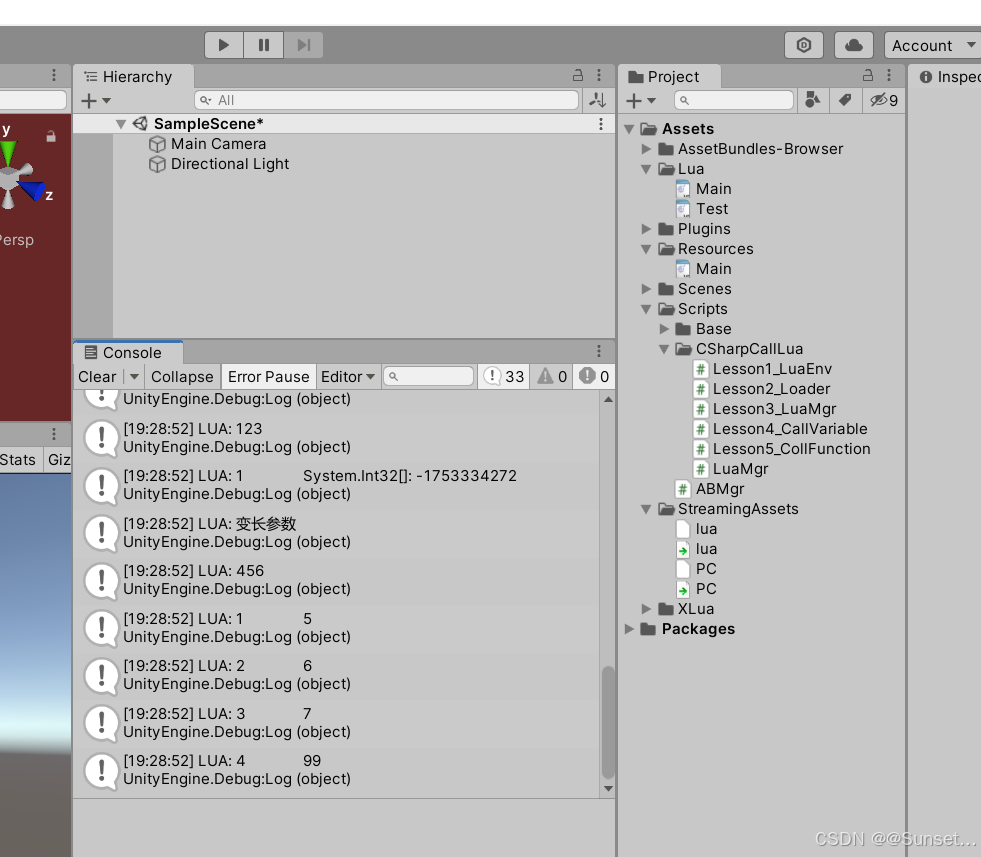
6.映射到List和Dictionary
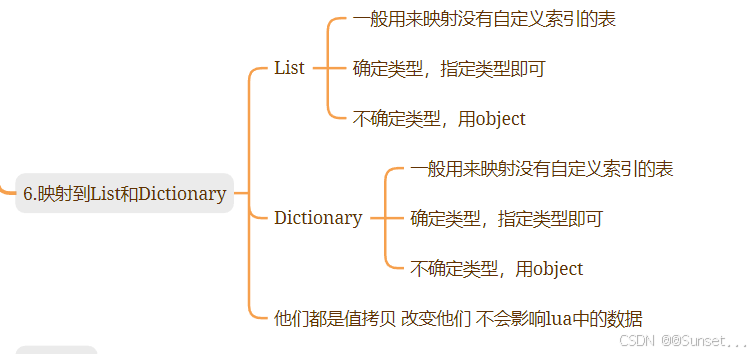
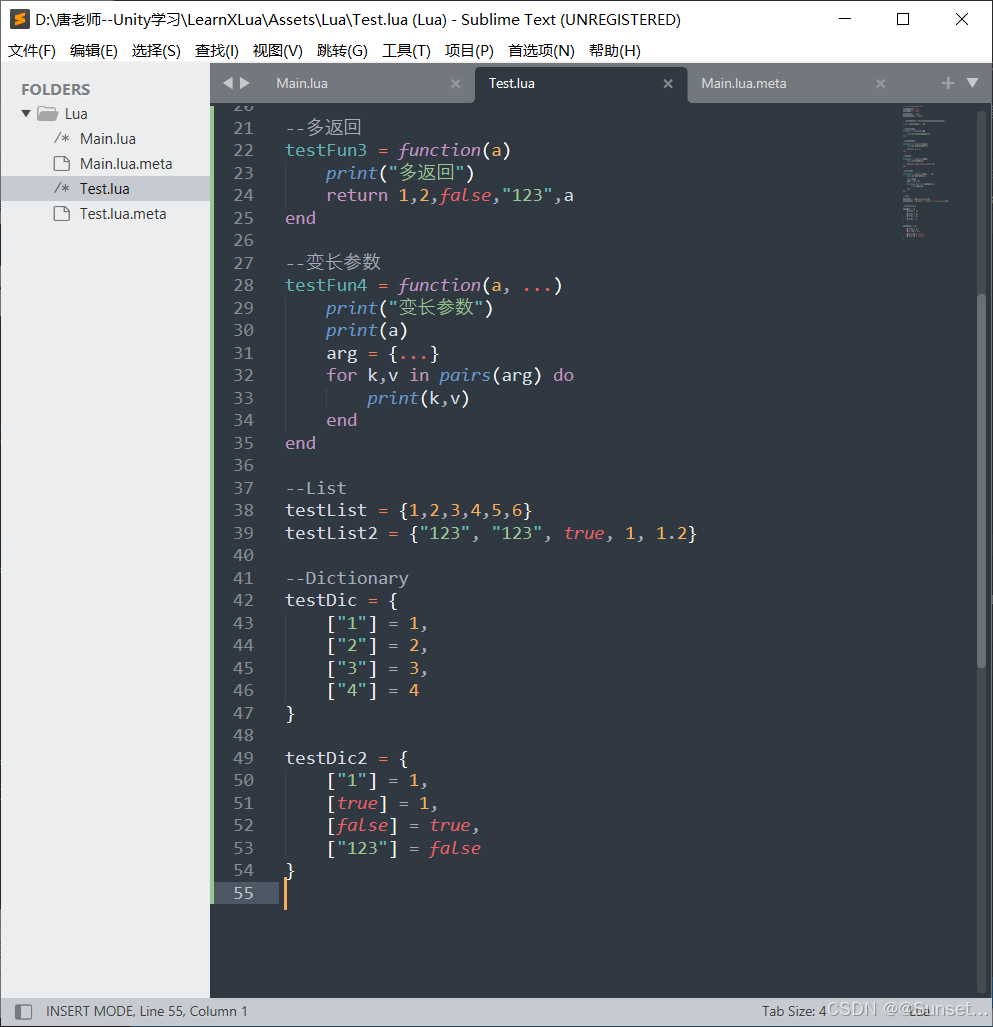
cs
using System.Collections;
using System.Collections.Generic;
using UnityEngine;
public class Lesson6_CollListDic : MonoBehaviour
{
// Start is called before the first frame update
void Start()
{
LuaMgr.GetInstance().Init();
LuaMgr.GetInstance().DoLuaFile("Main");
//同一类型List
List<int> list = LuaMgr.GetInstance().Global.Get<List<int>>("testList");
Debug.Log("**********list**************");
for (int i = 0; i < list.Count; i++)
{
Debug.Log(list[i]);
}
//值拷贝(浅拷贝) 不会改变lua中的内容
list[0] = 100;
List<int> list2 = LuaMgr.GetInstance().Global.Get<List<int>>("testList");
Debug.Log(list[0]);
//不指定类型的话 就用object
List<object> list3 = LuaMgr.GetInstance().Global.Get<List<object>>("testList2");
Debug.Log("*********list object***************");
for (int i = 0; i < list3.Count; i++)
{
Debug.Log(list3[i]);
}
Debug.Log("*********Dictionary***************");
Dictionary<string, int> dic = LuaMgr.GetInstance().Global.Get<Dictionary<string, int>>("testDic");
foreach (string item in dic.Keys)
{
Debug.Log(item + "_" + dic[item]);
}
//检测是不是 值拷贝 ------ 还是值拷贝
dic["1"] = 10000;
Dictionary<string, int> dic2 = LuaMgr.GetInstance().Global.Get<Dictionary<string, int>>("testDic");
Debug.Log(dic2["1"]);
//不指定类型 还是用 object
Debug.Log("*********Dictionary***************");
Dictionary<object, object> dic3 = LuaMgr.GetInstance().Global.Get<Dictionary<object, object>>("testDic2");
foreach (object item in dic3.Keys)
{
Debug.Log(item + "_" + dic3[item]);
}
}
// Update is called once per frame
void Update()
{
}
}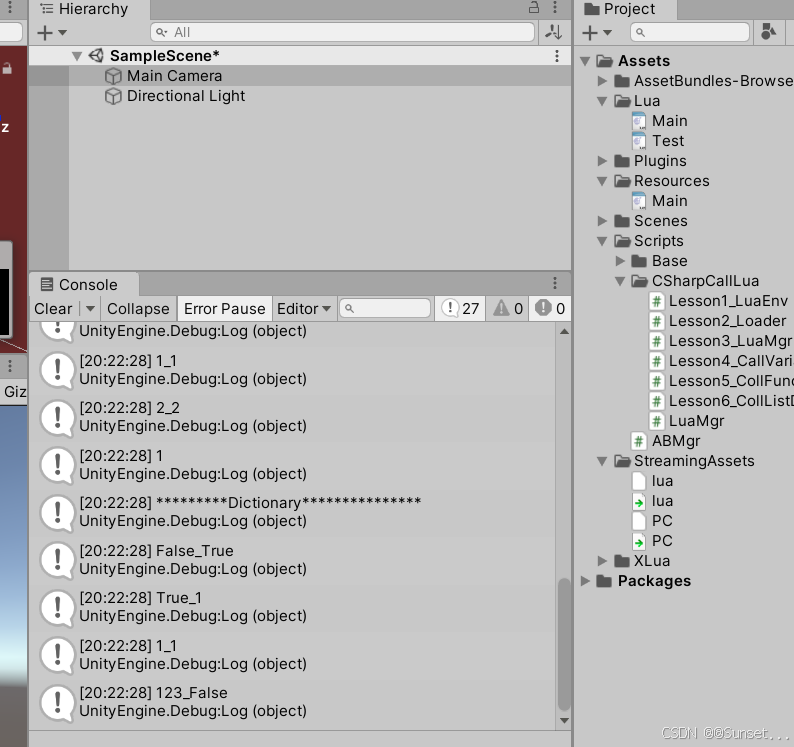
7.映射到类
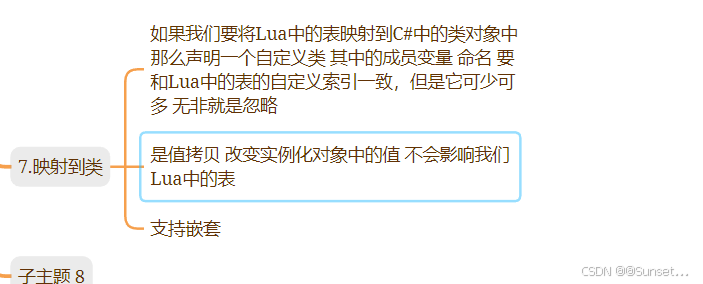
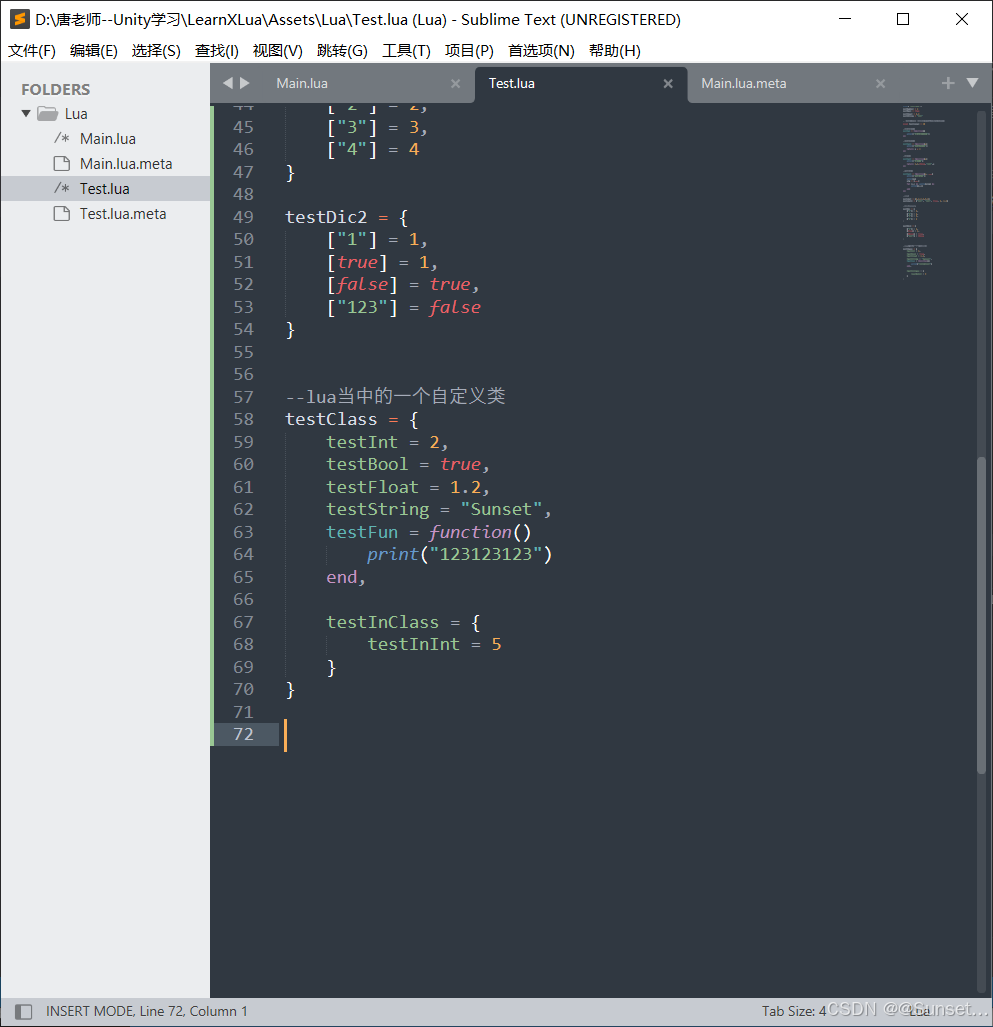
cs
using System.Collections;
using System.Collections.Generic;
using UnityEngine;
using UnityEngine.Events;
public class CallLuaClass
{
//在这个类中去声明成员变量
//名字一定要和 Lua那么的一样
//要公共的 (私有和保护的 没办法赋值)
//这个自定义中的 变量 可以更多也可以更少
//如果变量比 lua中的少 就会忽略它
//如果多了 不会赋值 也相当于忽略
public int testInt;
public bool testBool;
//public float testFloat;
public string testString;
public int i;
public UnityAction testFun;
public CallLuaInClass testInClass;
}
public class CallLuaInClass
{
public int testInInt;
}
public class Lesson7_CallClass : MonoBehaviour
{
// Start is called before the first frame update
void Start()
{
LuaMgr.GetInstance().Init();
LuaMgr.GetInstance().DoLuaFile("Main");
CallLuaClass obj = LuaMgr.GetInstance().Global.Get<CallLuaClass>("testClass");
Debug.Log(obj.testInt);
Debug.Log(obj.testBool);
//Debug.Log(obj.testFloat);
Debug.Log(obj.testString);
Debug.Log(obj.i);
Debug.Log("嵌套里的:" + obj.testInClass.testInInt);
obj.testFun();
//测试 是否是值拷贝
//值拷贝 改变它 不会改变Lua表里的内容
obj.testInt = 100;
CallLuaClass obj2 = LuaMgr.GetInstance().Global.Get<CallLuaClass>("testClass");
Debug.Log(obj2.testInt);
}
// Update is called once per frame
void Update()
{
}
}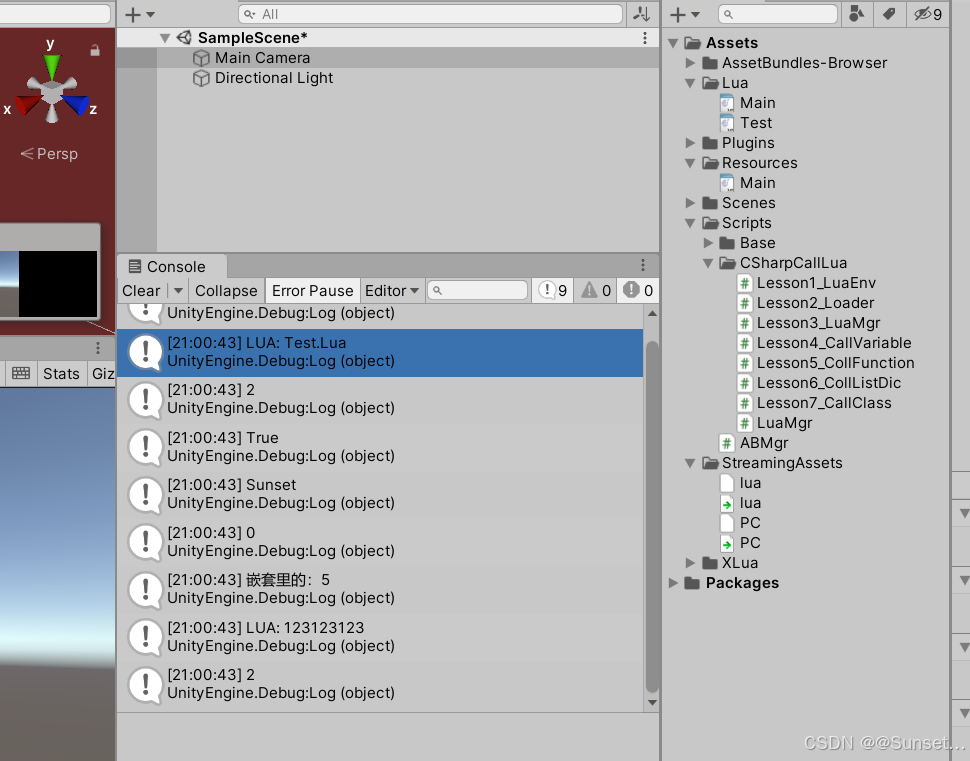
8.映射到接口
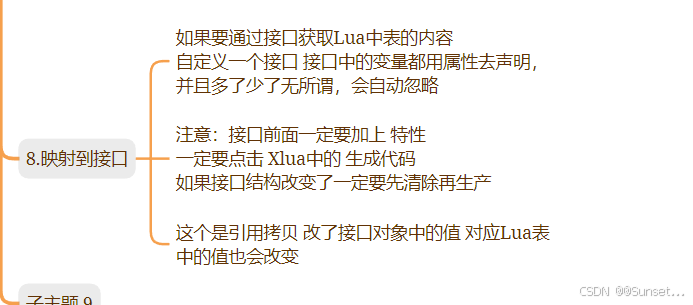
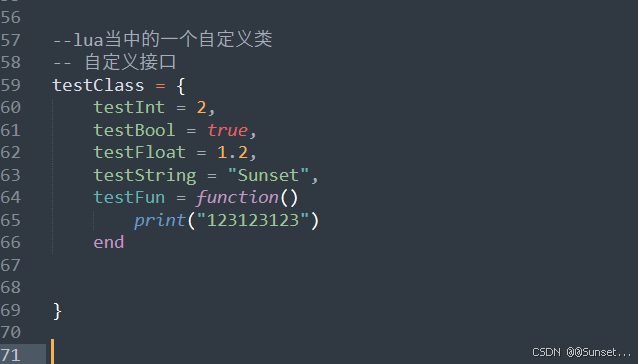
cs
using System.Collections;
using System.Collections.Generic;
using UnityEngine;
using UnityEngine.Events;
using XLua;
//接口中是不允许有成员变量的 但是可以有属性
//我们可以用属性来接收
//接口和类规则一样 其中的属性多了少了 不影响结果 无非就是忽略
//嵌套几乎和类一样 无非 是要遵循接口的规则
[CSharpCallLua]
public interface ICSharpCallInterface
{
int testInt
{
get;
set;
}
bool testBool
{
get;
set;
}
//float testFloat
//{
// get;
// set;
//}
string testString
{
get;
set;
}
UnityAction testFun
{
get;
set;
}
float testFloat22
{
get;
set;
}
}
public class Lesson8_CallInterface : MonoBehaviour
{
// Start is called before the first frame update
void Start()
{
LuaMgr.GetInstance().Init();
LuaMgr.GetInstance().DoLuaFile("Main");
ICSharpCallInterface obj = LuaMgr.GetInstance().Global.Get<ICSharpCallInterface>("testClass");
Debug.Log(obj.testInt);
Debug.Log(obj.testBool);
Debug.Log("新加的:" + obj.testFloat22);
Debug.Log(obj.testString);
obj.testFun();
//测试 是否 值拷贝
//接口拷贝 是引用拷贝 改了值 lua表中的值也变了
obj.testInt = 1000;
ICSharpCallInterface obj2 = LuaMgr.GetInstance().Global.Get<ICSharpCallInterface>("testClass");
Debug.Log(obj2.testInt); // 1000
}
// Update is called once per frame
void Update()
{
}
}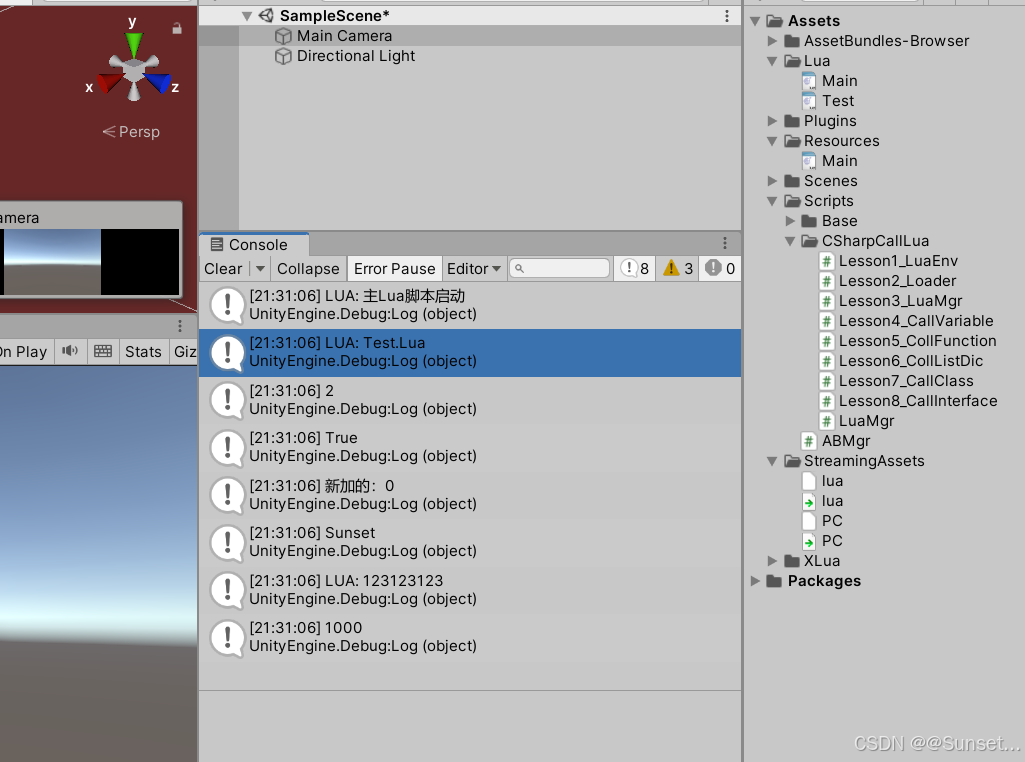
9.映射到LuaTable

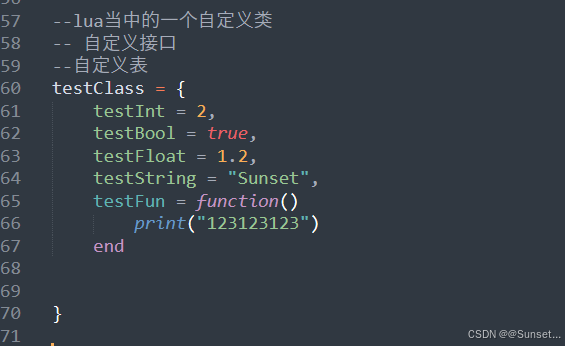
cs
using System.Collections;
using System.Collections.Generic;
using UnityEngine;
using UnityEngine.Events;
using XLua;
public class Lesson9_CallLuaTable : MonoBehaviour
{
// Start is called before the first frame update
void Start()
{
LuaMgr.GetInstance().Init();
LuaMgr.GetInstance().DoLuaFile("Main");
//官方不建议使用LuaTable 和 LuaFunction 因为效率低 并且会产生垃圾
//引用对象
LuaTable table = LuaMgr.GetInstance().Global.Get<LuaTable>("testClass");
Debug.Log(table.Get<int>("testInt"));
Debug.Log(table.Get<bool>("testBool"));
Debug.Log(table.Get<float>("testFloat"));
Debug.Log(table.Get<string>("testString"));
table.Get<LuaFunction>("testFun").Call();
//引用拷贝
table.Set("testInt", 55);
LuaTable table2 = LuaMgr.GetInstance().Global.Get<LuaTable>("testClass");
Debug.Log(table2.Get<int>("testInt"));
//用完 table 记得要 清除它 不然会产生垃圾
table.Dispose();
table2.Dispose();
}
// Update is called once per frame
void Update()
{
}
}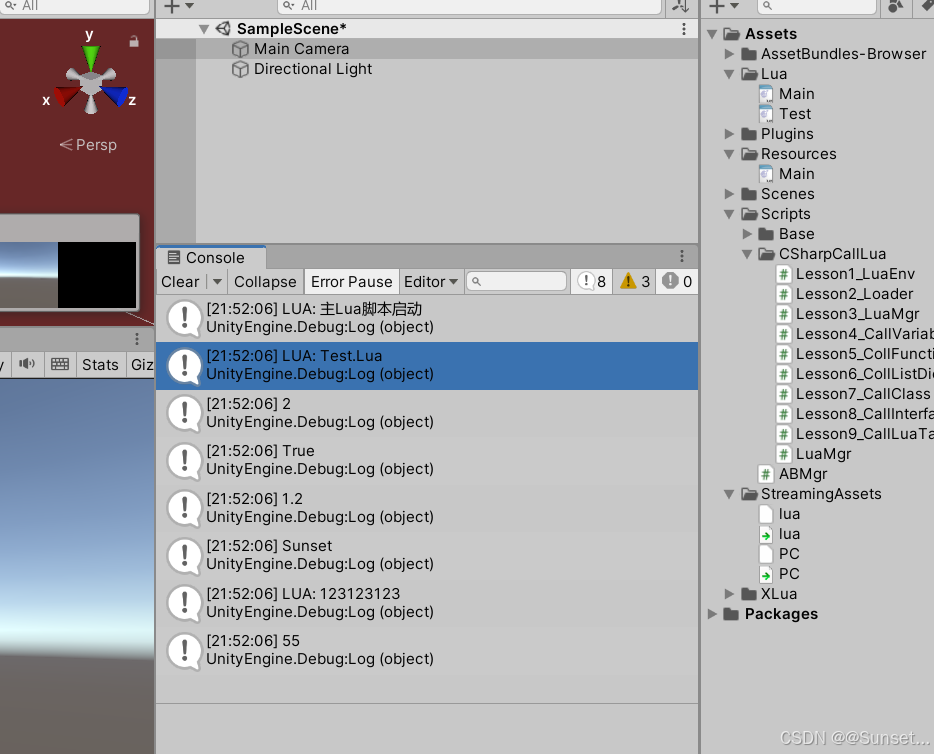
10.CSharpCallLua特性什么时候用

Lua调用C#
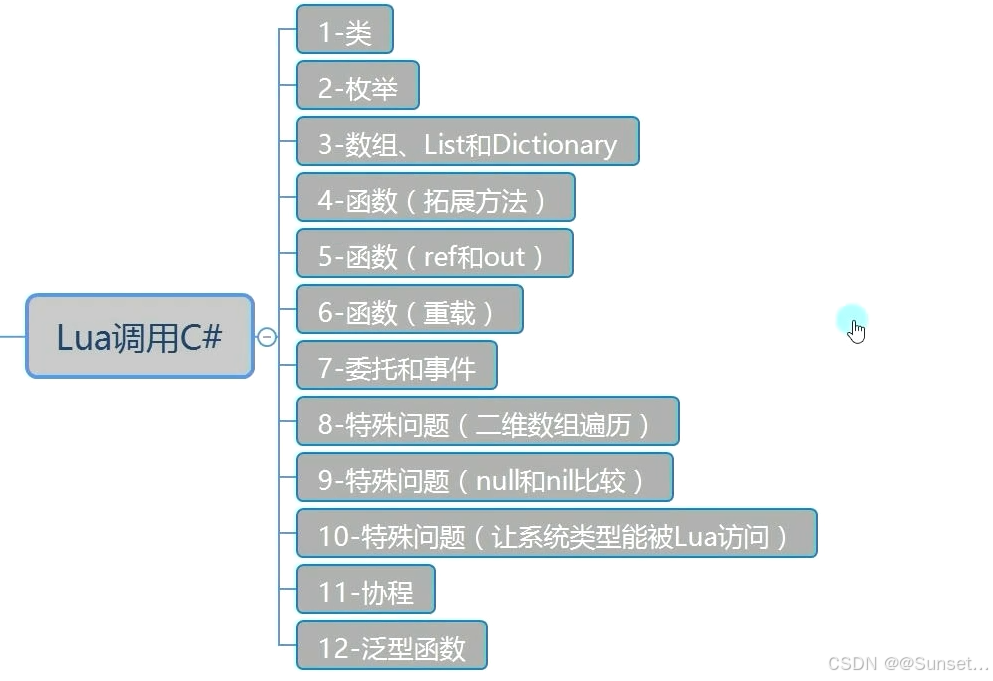
1.类
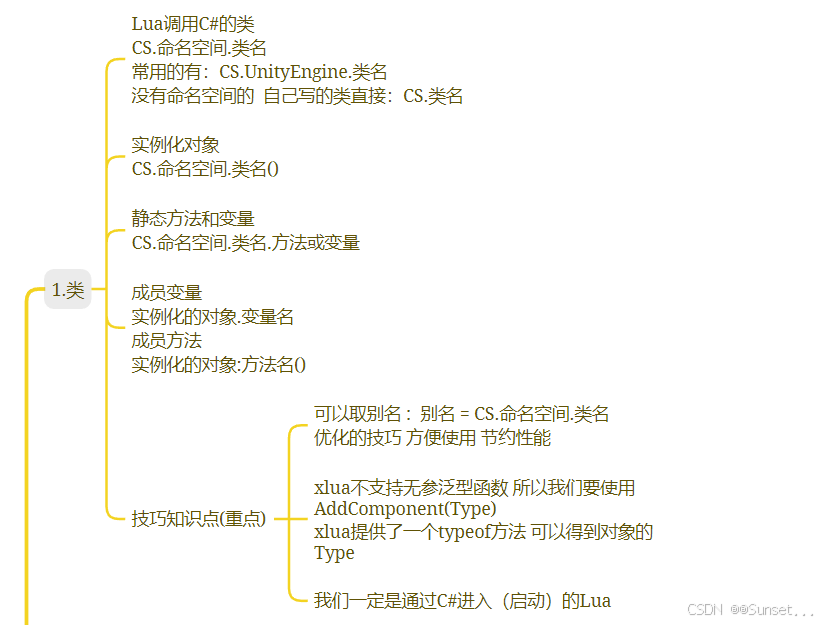
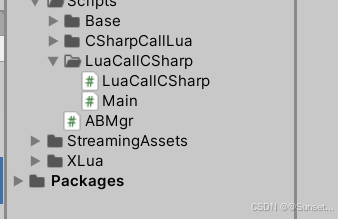
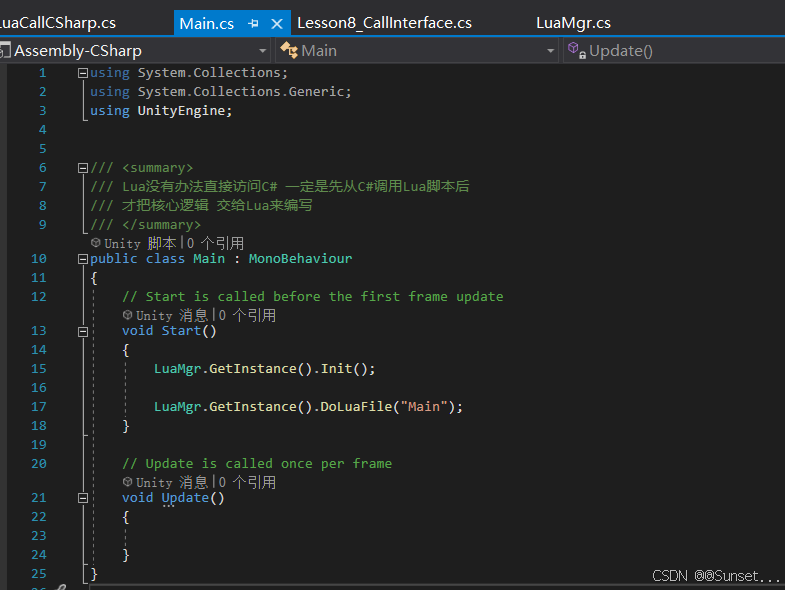
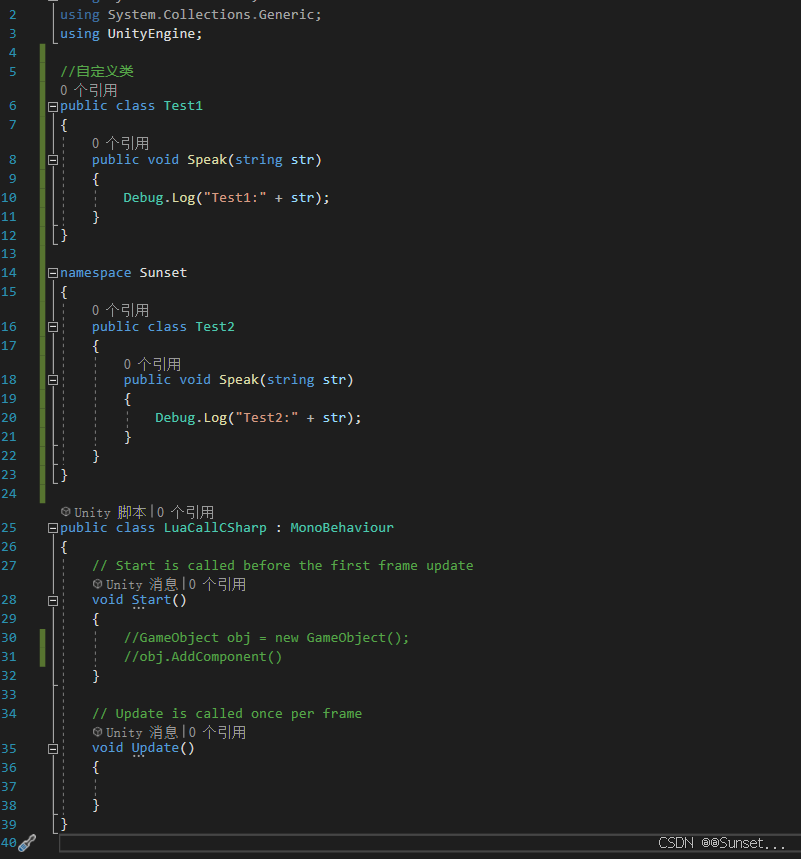
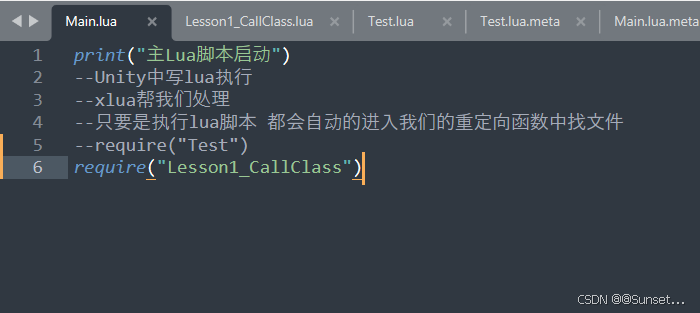
Lua
print("************Lua 调用 C#类相关知识点************")
--lua中使用C#的类非常简单
--固定套路:
--CS.命名空间.类名
--Unity的类 比如 GameObject Transform等等 ------ CS.UnityEngine.类名
--CS.UnityEngine.GameObject
--通过C#中的类 实例化一个对象 lua中没有new 所以我们直接 类名括号就是实例化对象
--默认调用的 相当于就是无参构造
local obj1 = CS.UnityEngine.GameObject()
local obj1 = CS.UnityEngine.GameObject("Sunset") --带传参
--为了方便使用 并且节约性能 定义全局变量存储 C#中的类
--这样定义 相当于是取了一个别名
GameObject = CS.UnityEngine.GameObject
local obj3 = GameObject("山有木兮")
--类中的静态对象 可以直接使用 .来调用
local obj4 = GameObject.Find("Sunset")
--得到对象中的成员变量 直接对象 . 即可
print(obj4.transform.position)
Debug = CS.UnityEngine.Debug
Debug.Log(obj4.transform.position)
Vector3 = CS.UnityEngine.Vector3
--如果使用对象中的 成员方法 !!! 一定要加 冒号 :
obj4.transform:Translate(Vector3.right)
Debug.Log(obj4.transform.position)
--自定义类 使用方法 相同 只是命名空间不同而已
local t = CS.Test1()
t:Speak("说话")
local t2 = CS.Sunset.Test2()
t2:Speak("说话")
--继承了Mono的类
--继承了Mono的类 是不能直接 new
local obj5 = GameObject("加脚本测试")
--通过GameObject的 AddComponent 添加脚本
--xlua提供了一个重要方法 typeof 可以得到类的Type
--xlua中不支持 无参泛型函数 所以 我们要使用另一个重载
obj5:AddComponent(typeof(CS.LuaCallCSharp))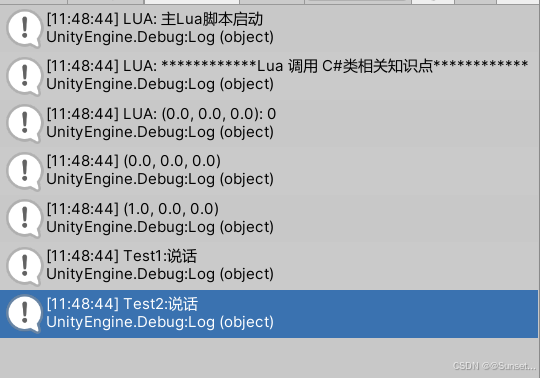
2.枚举
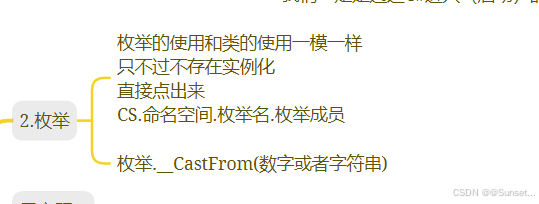
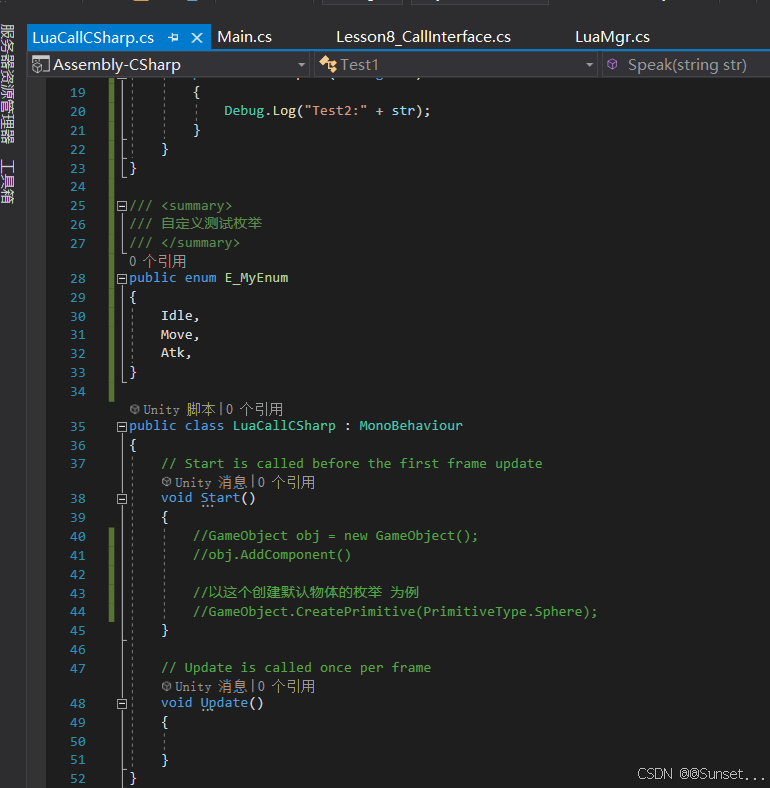
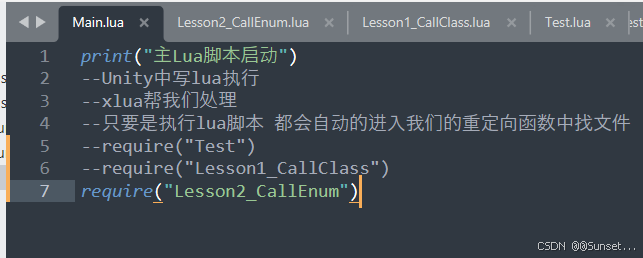
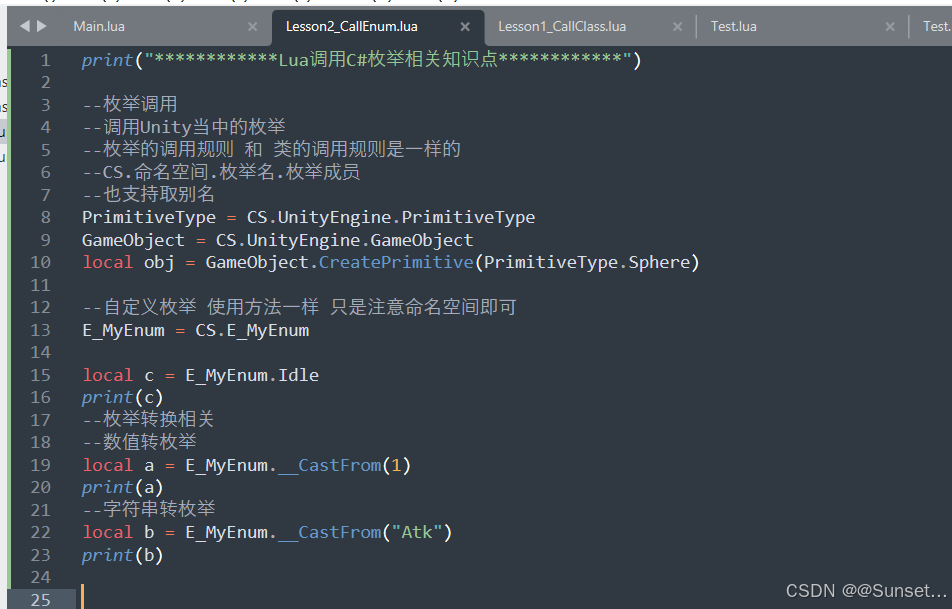
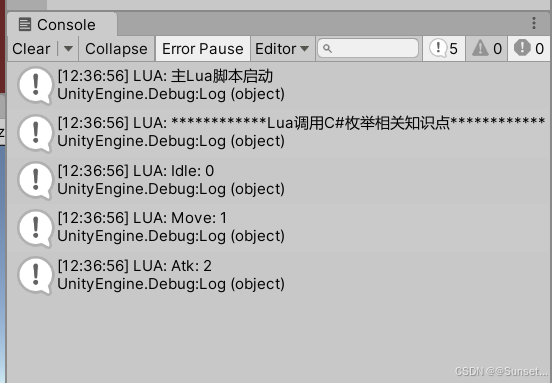
3.数组、List和Dictionary
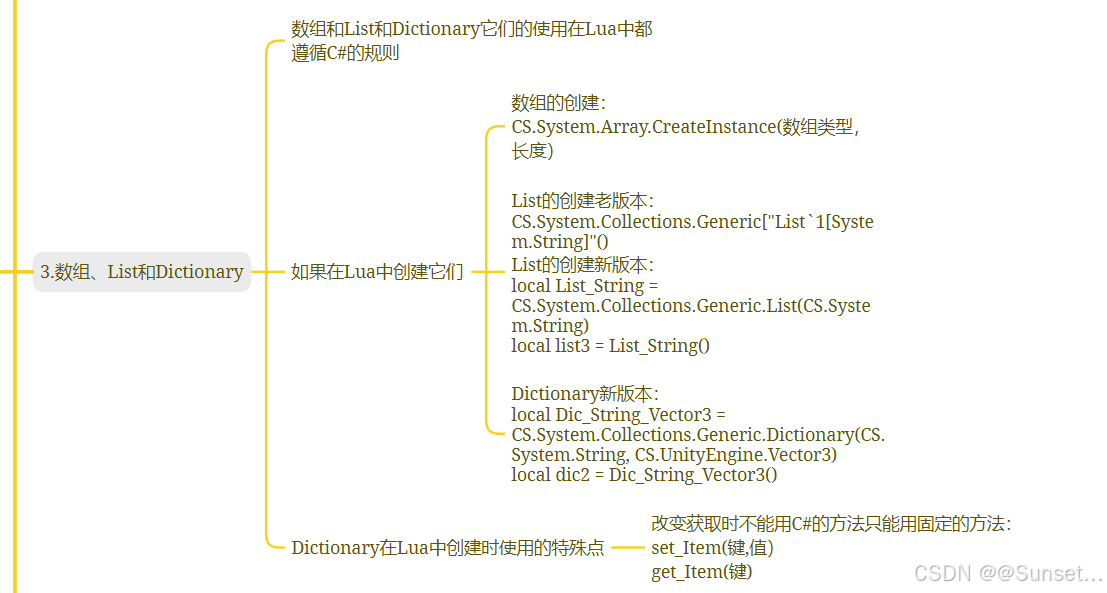
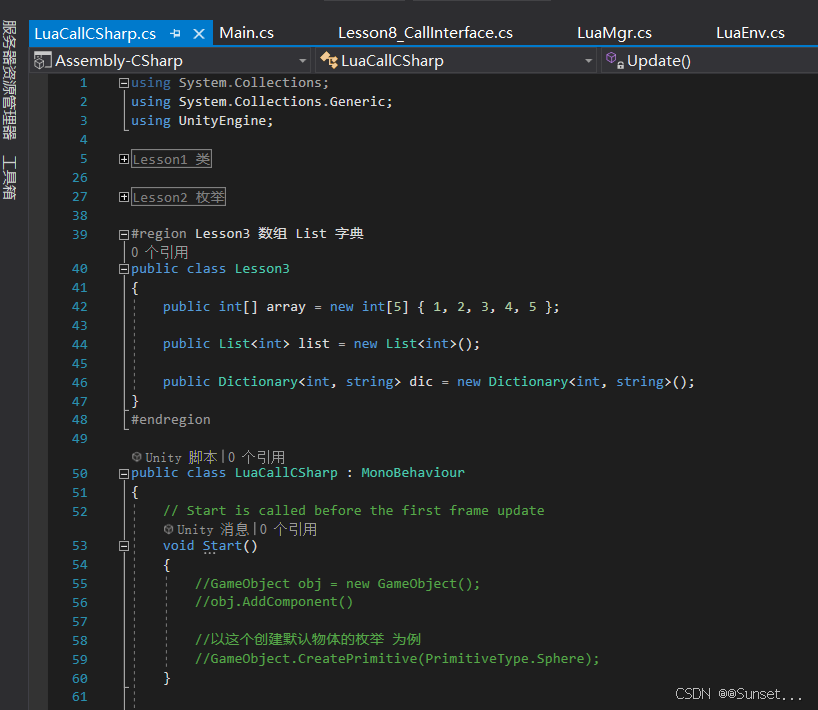
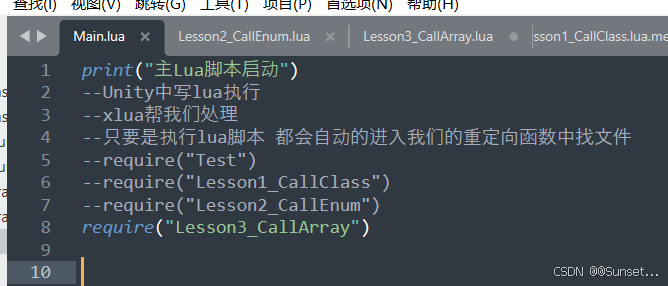
Lua
print("**********Lua调用C# 数组 相关知识点********")
-- 实例化出对象
local obj = CS.Lesson3()
--Lua使用C#数组相关知识
--长度 userdata
--C#怎么用 lua就怎么用 不能使用#去获取长度
print(obj.array.Length)
--访问元素
print(obj.array[0])
--遍历要注意 虽然lua中索引从1开始
--但是数组是C#那边的规则 所以 还是按C#的0开始
--注意最大值 一定要减1
for i=0,obj.array.Length-1 do
print(obj.array[i])
end
--Lua中创建一个C#的数组 Lua中表示数组和List可以用比表
--但是若要使用C#中???
--创建C#中的数组 使用 Array类中的静态方法即可
--该方法就是创建一个数组,第一个参数是数组类型,第二个参数是数组大小
local array2 = CS.System.Array.CreateInstance(typeof(CS.System.Int32), 10)
print(array2.Length)
print(array2[0])
print(array2[1])
print(array2)
print("**********Lua调用C# list 相关知识点********")
--调用成员方法 用冒号
obj.list:Add(1)
obj.list:Add(2)
obj.list:Add(3)
--长度
print(obj.list.Count)
--遍历
for i = 0,obj.list.Count-1 do
print(obj.list[i])
end
print(obj.list)
--在Lua中创建一个List对象
--老版本中
local list2 = CS.System.Collections.Generic["List`1[System.String]"]()
print(list2)
list2:Add("123")
print(list2[0])
--新版本 > v2.1.12
--相当于得到一个 List<string> 的一个类别名 需要再实例化
local List_String = CS.System.Collections.Generic.List(CS.System.String)
local list3 = List_String()
list3:Add("555555")
print(list3[0])
print("**********Lua调用C# Dictionary 相关知识点********")
--使用和C#一致
obj.dic:Add(1, "123")
print(obj.dic[1])
--遍历
for k,v in pairs(obj.dic) do
print(k,v)
end
--在Lua中创建一个字典对象
--也分老版本和新版本
--这里只讲解 新版本(老版本可以去了解)
local Dic_String_Vector3 = CS.System.Collections.Generic.Dictionary(CS.System.String, CS.UnityEngine.Vector3)
local dic2 = Dic_String_Vector3()
dic2:Add("123",CS.UnityEngine.Vector3.right)
for k,v in pairs(dic2) do
print(k,v)
end
--在Lua中创建的字典 直接通过键中括号得 是得不到 返回的是nil
print(dic2["123"])
--字典里还有一个方法也能够正常得到值
print(dic2:TryGetValue("123")) -- 返回两个值 true 值
--如果要通过键获取值 要通过这个固定方法
print(dic2:get_Item("123"))
dic2:set_Item("123", nil)
print(dic2:get_Item("123"))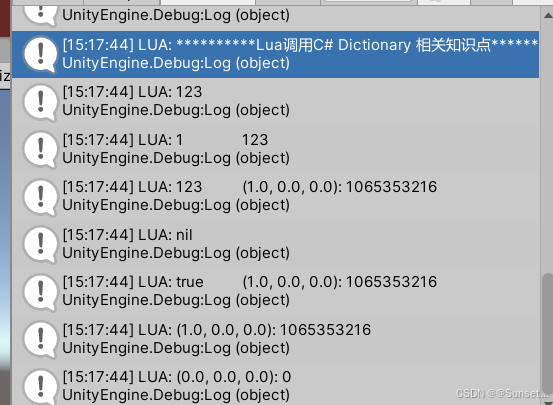
4.函数(拓展方法)

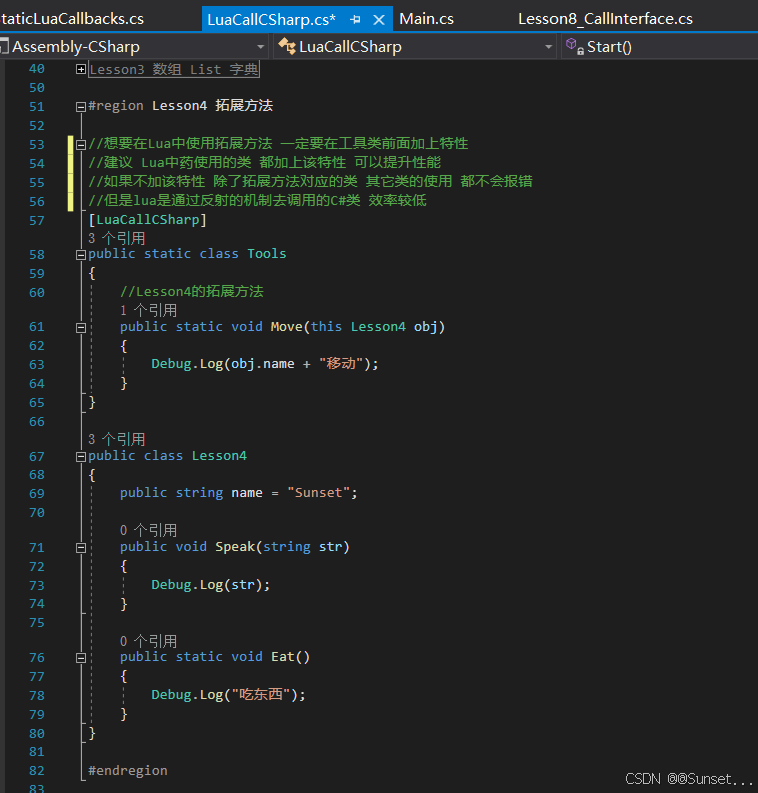
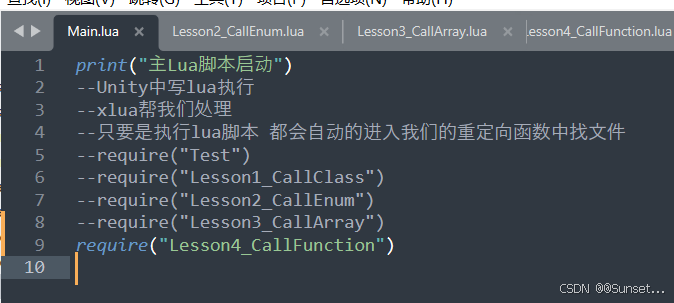
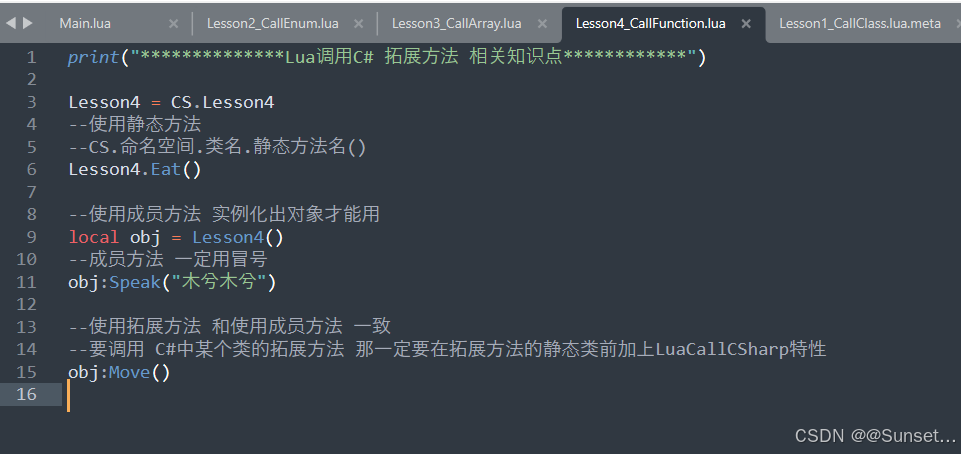
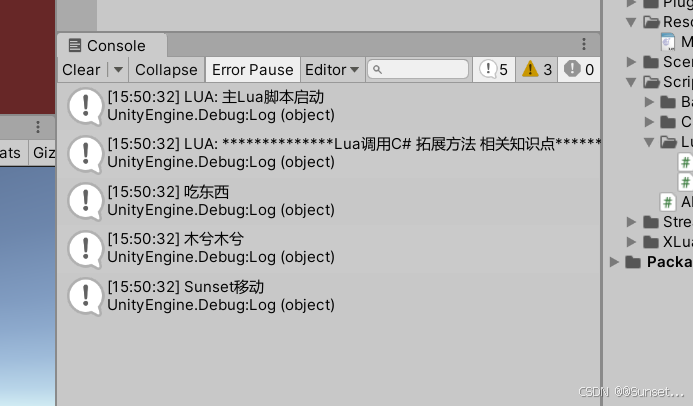
5.函数(ref 和 out)
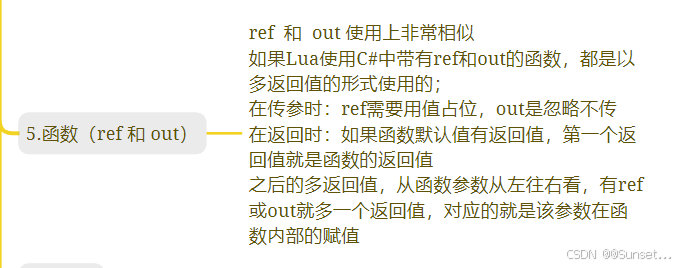
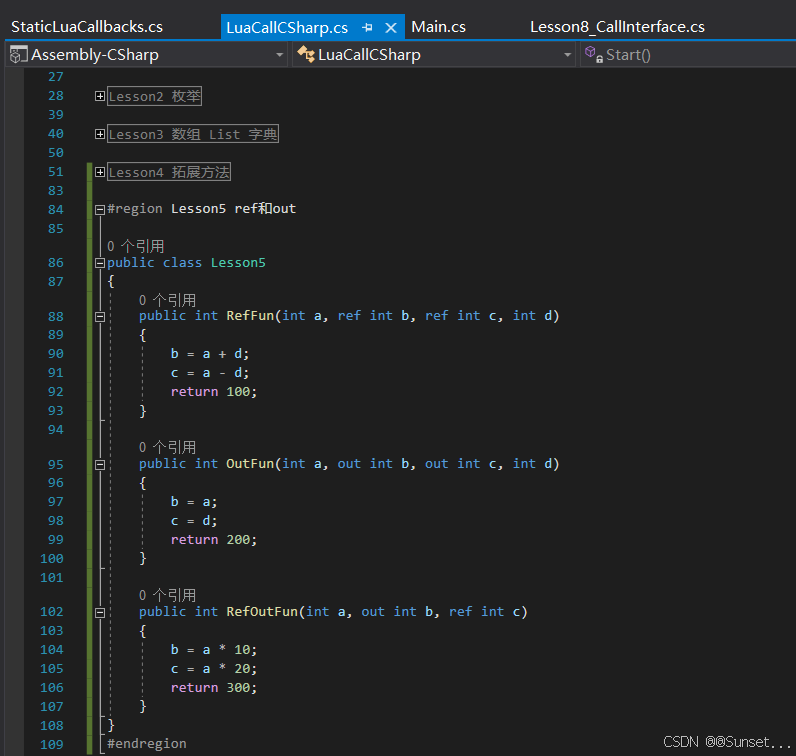
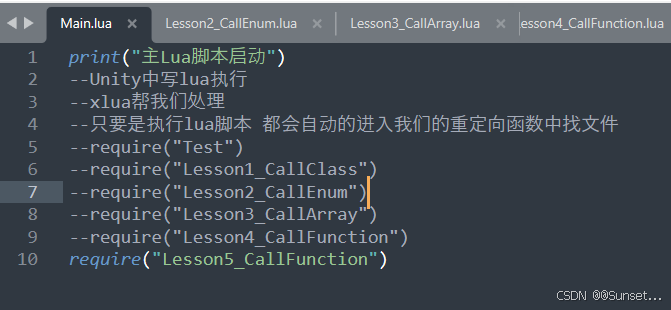
Lua
print("***********Lua调用C# ref 方法相关知识点***********")
Lesson5 = CS.Lesson5
local obj = Lesson5()
--ref参数 会以多返回值的形式返回给lua
--如果函数存在返回值 那么第一个值 就是该返回值
--之后的返回值 就是ref的结果 从左到右一一对应
--ref参数 需要传入一个默认值 占位置
--a 相当于 函数返回值
--b 第一个ref
--c 第二个ref
local a,b,c = obj:RefFun(1, 0, 0, 1)
print(a)
print(b)
print(c)
print("***********Lua调用C# out 方法相关知识点***********")
--out参数 也会以多返回值的形式返回给lua
--如果函数存在返回值 那么第一个值 就是该返回值
--之后的返回值 就是out的结果 从左到右一一对应
--out参数 不需要传占位置的值
local a,b,c = obj:OutFun(20, 30)
print(a)
print(b)
print(c)
--混合使用时 综合上面的规则
--ref 需要占位 out不用传
--第一个是函数的返回值 之后 从左到右依次对应ref或者out
local a,b,c = obj:RefOutFun(20, 1) --ref 的占位值不一定要是0,可以用其他数
print(a) --300
print(b) --200
print(c) --400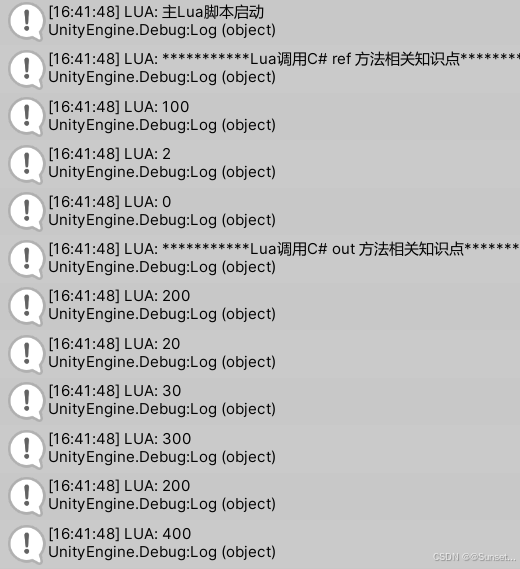
6.函数(重载)
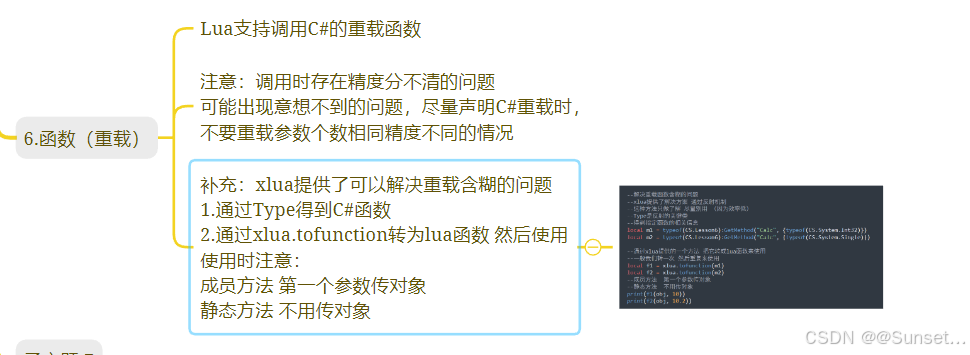
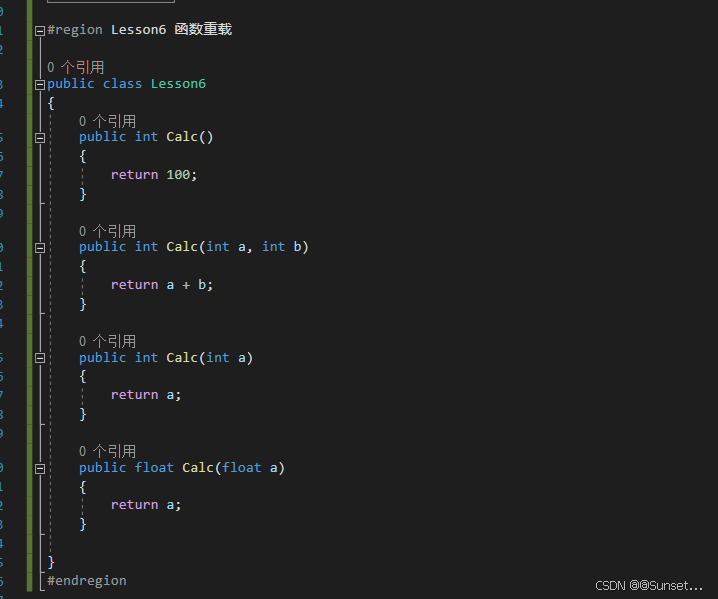
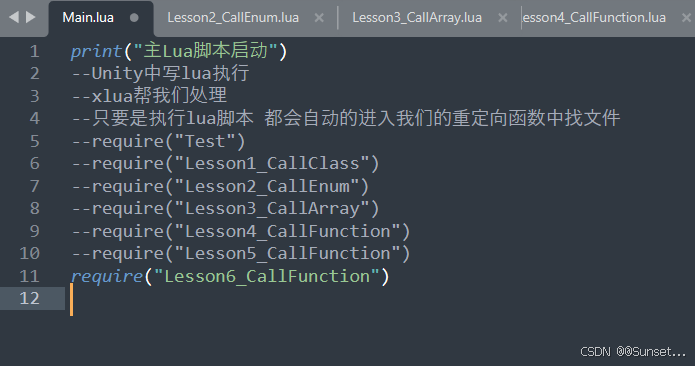
Lua
print("**********Lua调用C# 重载函数相关知识点**********")
Lesson6 = CS.Lesson6
local obj = Lesson6()
--虽然Lua自己不支持写重载函数
--但是Lua支持调用C#中的重要函数
print(obj:Calc())
print(obj:Calc(15, 1))
--Lua虽然支持调用C#重载函数
--但是因为Lua中的数值类型 只有Number
--对C#中多精度的重载函数支持的不好 会傻傻分不清
--在使用时 可能出现意向不到的问题
print(obj:Calc(10))
print(obj:Calc(10.2))
--解决重载函数含糊的问题
--xlua提供了解决方案 通过反射机制
--这种方法只做了解 尽量别用 (因为效率低)
--Type是反射的关键类
--得到指定函数的相关信息
local m1 = typeof(CS.Lesson6):GetMethod("Calc", {typeof(CS.System.Int32)})
local m2 = typeof(CS.Lesson6):GetMethod("Calc", {typeof(CS.System.Single)})
--通过xlua提供的一个方法 把它转成lua函数来使用
--一般我们转一次 然后重复来使用
local f1 = xlua.tofunction(m1)
local f2 = xlua.tofunction(m2)
--成员方法 第一个参数传对象
--静态方法 不用传对象
print(f1(obj, 10))
print(f2(obj, 10.2))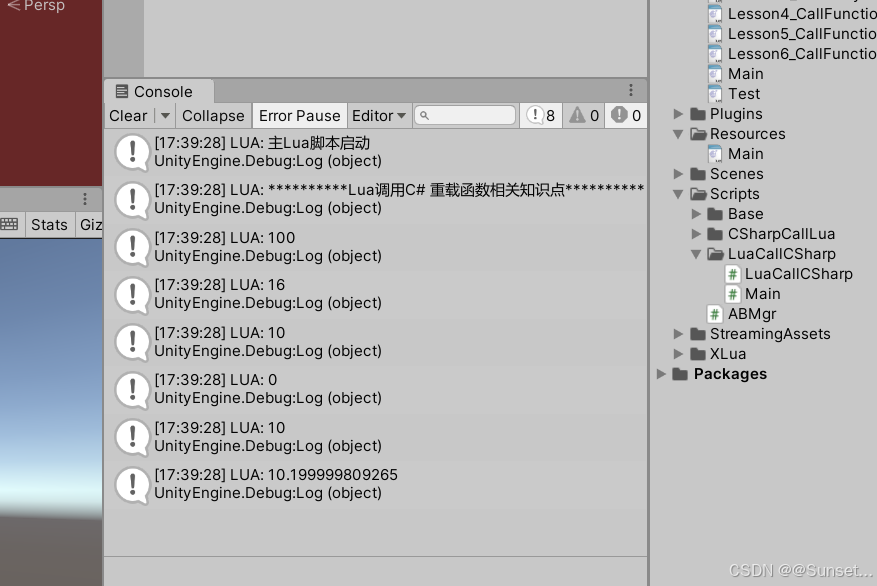
7.委托和事件
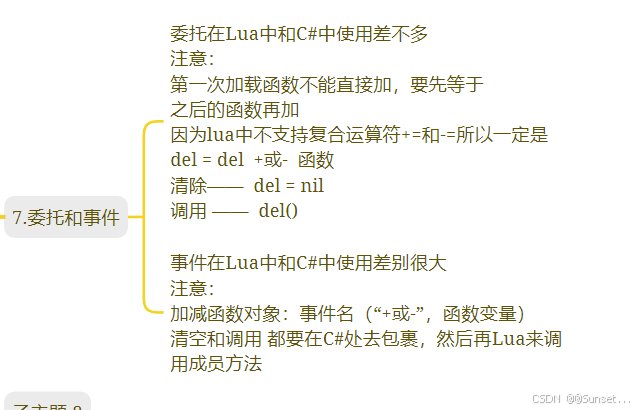
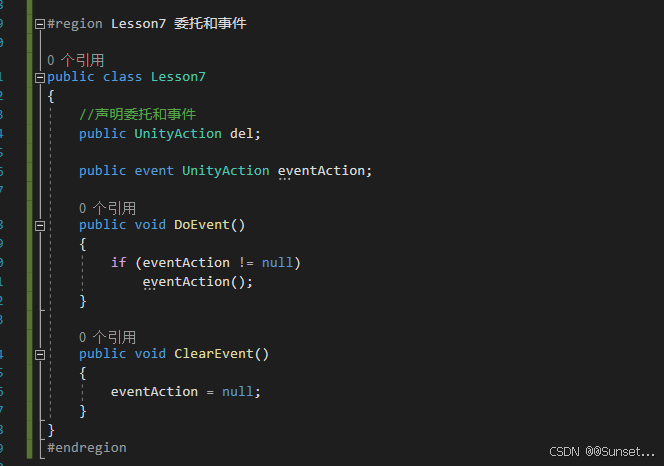
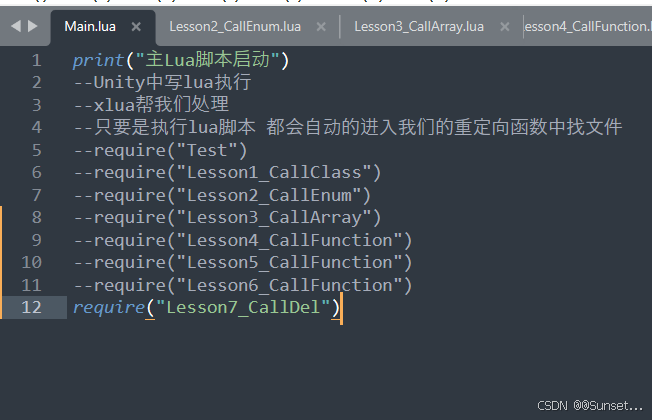
Lua
print("**********Lua调用C# 委托 相关知识点********")
local obj = CS.Lesson7()
--委托是用来装函数的
--使用C#中的委托 就是用来装lua函数的
local fun = function()
print("Lua函数Fun")
end
print("********加函数********")
--Lua中没有复合运算符 不能 +=
--如果第一次往委托中加函数 因为是nil 不能直接+
--所以第一次 要先等 +
obj.del = fun
obj.del = obj.del + fun
--不建议这么写 最好还是 先声明函数再加 (因为这个像匿名函数,后面移除会不好找)
obj.del = obj.del + function()
print("临时声明的函数")
end
--委托执行
obj.del()
print("********减函数********")
obj.del = obj.del - fun
obj.del = obj.del - fun
obj.del()
print("********清空函数********")
--第三个函数没有函数名
--只能清空所有存储的函数
obj.del = nil
--清空后得先 等于
obj.del = fun
--调用
obj.del()
print("**********Lua调用C# 事件 相关知识点********")
local fun2 = function()
print("事件加的函数")
end
print("********事件加函数********")
--事件加减函数 和 委托非常不一样
--Lua中使用C#事件 加函数
--有点类似使用成员方法 冒号 事件名("+", 函数变量)
obj:eventAction("+", fun2)
--最好也不要这么写
obj:eventAction("+", function()
print("事件加的匿名函数")
end)
--调用只能在内部给出方法
obj:DoEvent()
print("********事件减函数********")
obj:eventAction("-", fun2)
obj:DoEvent()
print("********事件清除********")
--请事件 不能直接设空
--因为在C#中事件是不允许在外部等于和调用的
--obj:eventAction = nil
--但是我们可以在这个事件的类的内部写一个清除的方法出来调用
obj:ClearEvent()
obj:DoEvent()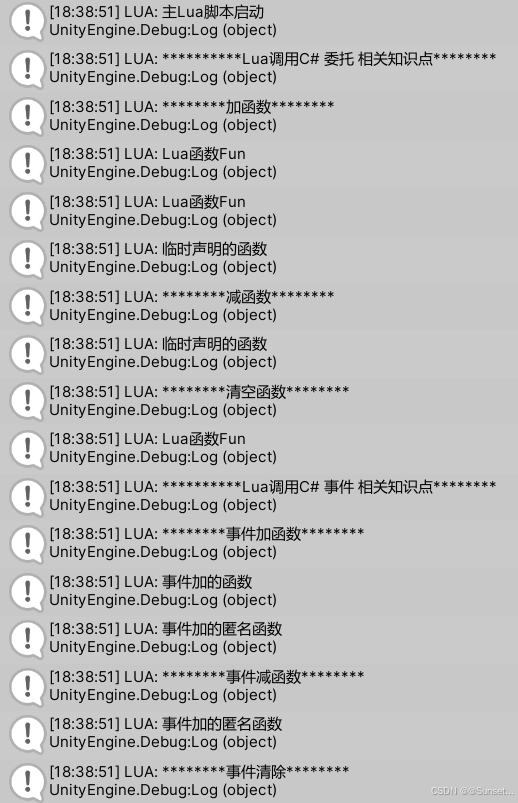
8.特殊问题(二维数组遍历)

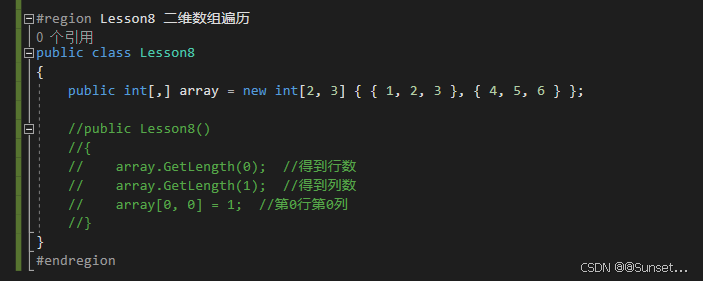
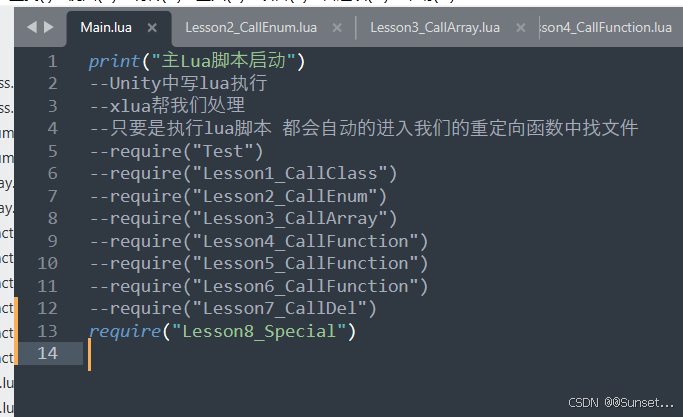
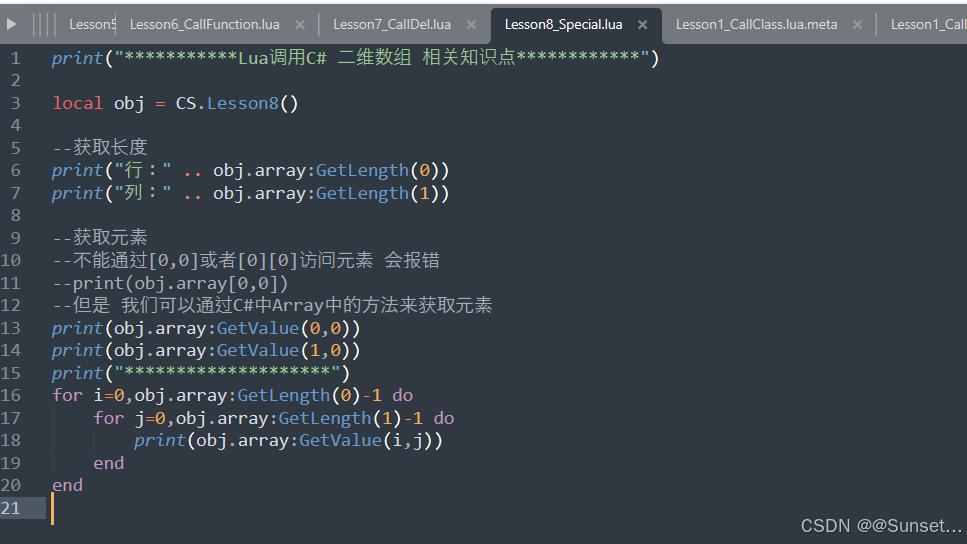
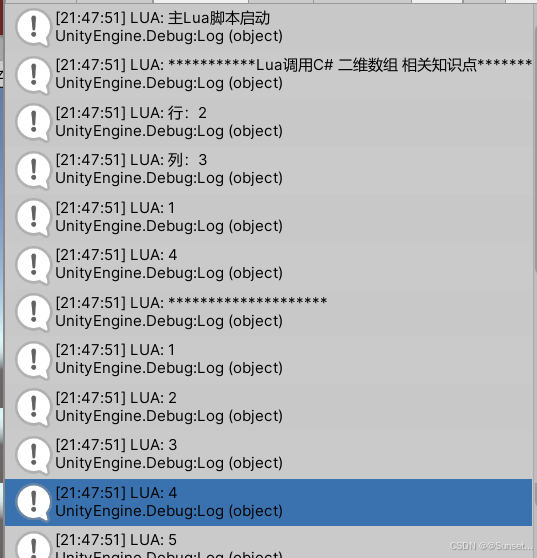
9.特殊问题(null和ni比较)
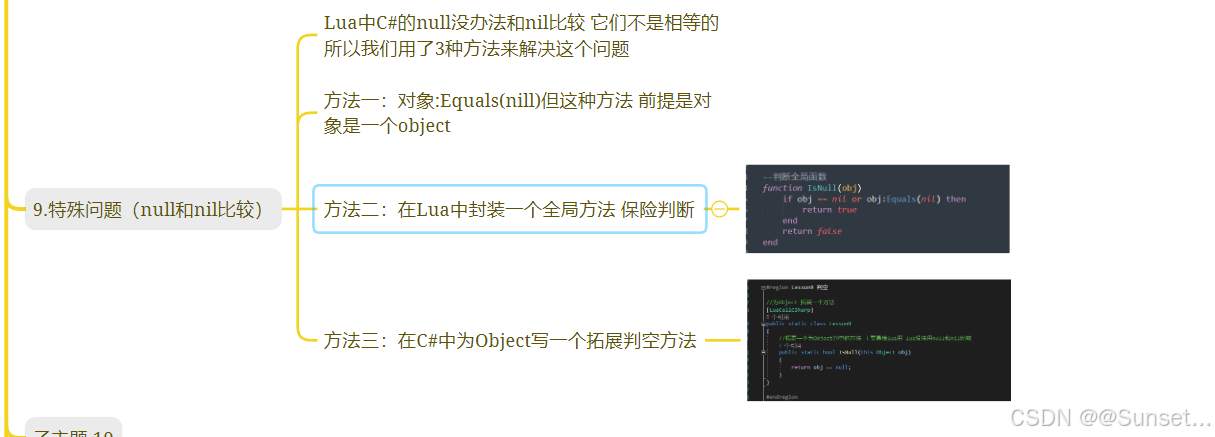
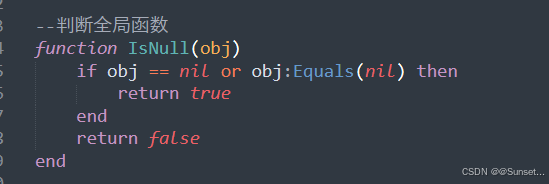
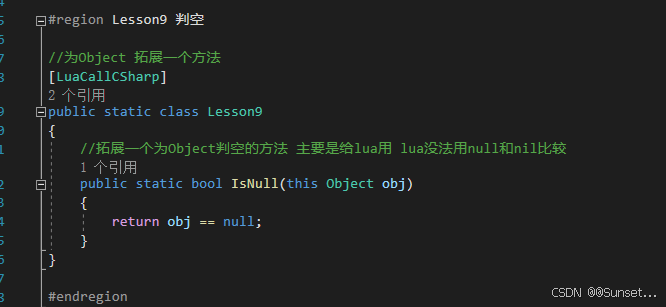
拓展方法记得加特性
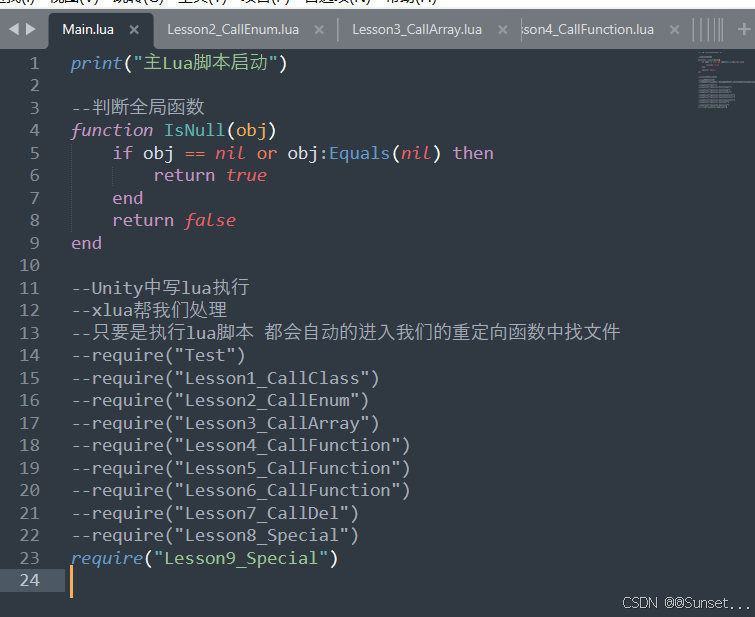
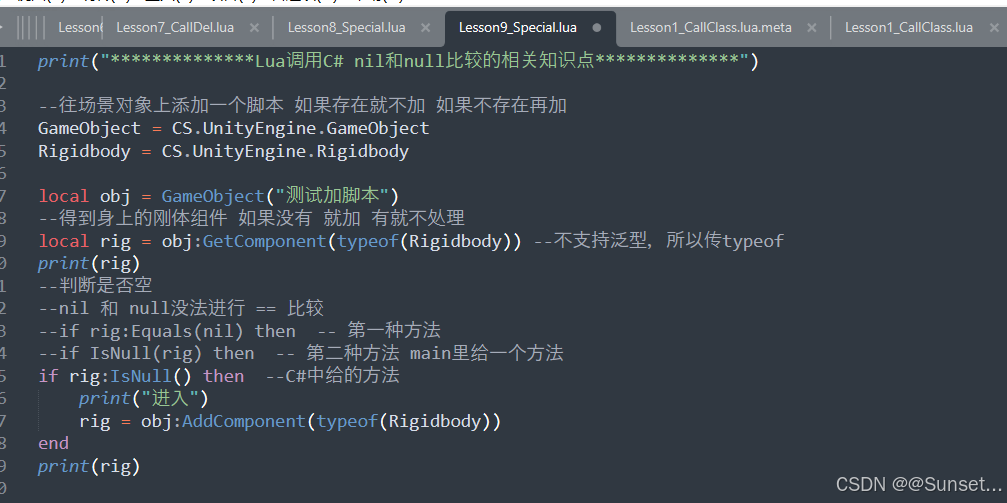
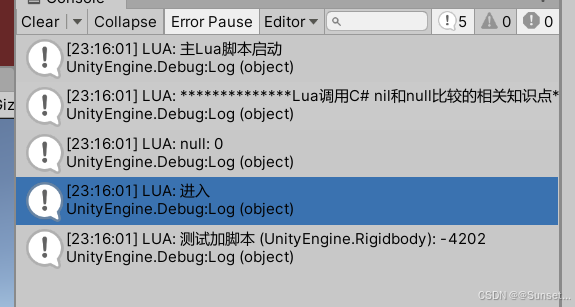
10.特殊问题(让系统类型和Lua能相互访问)
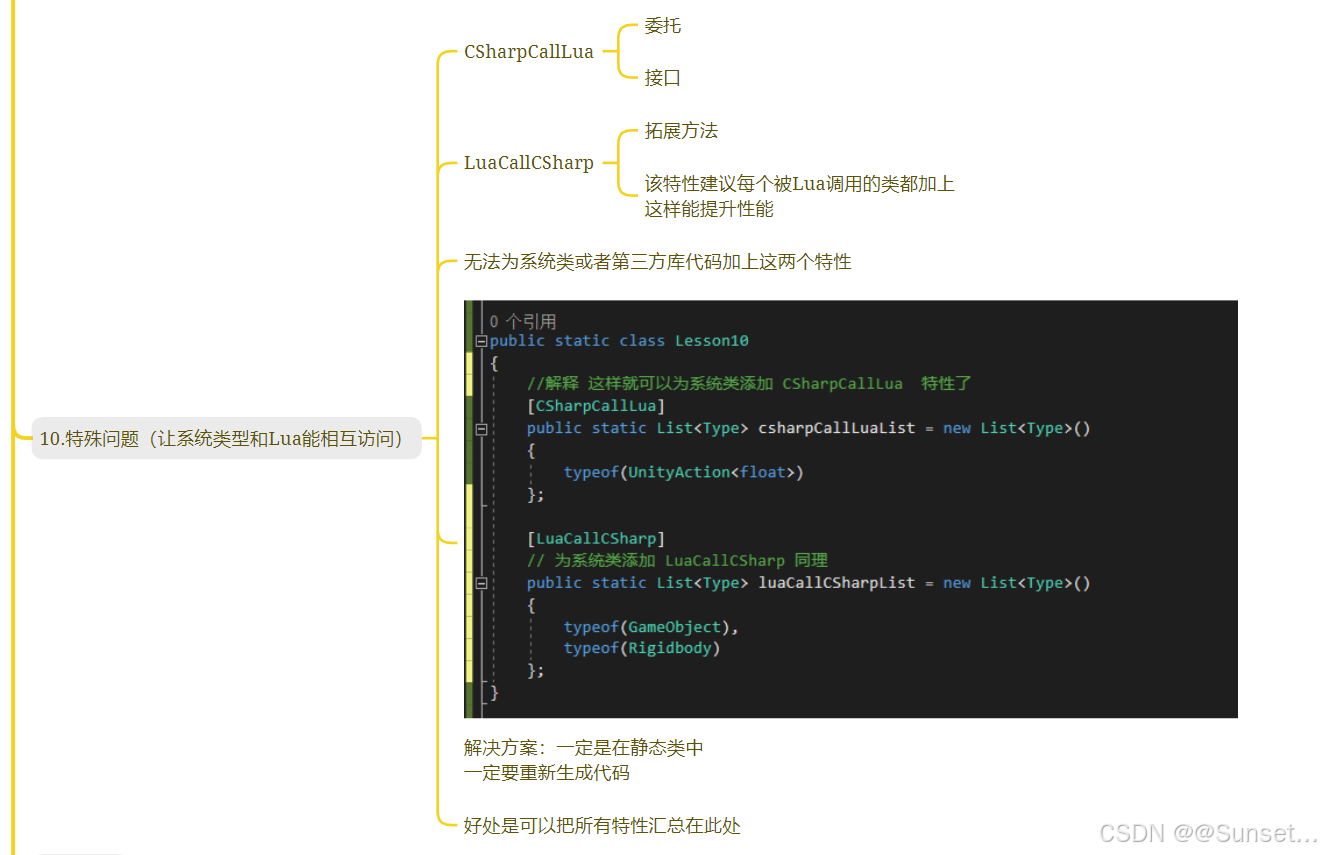
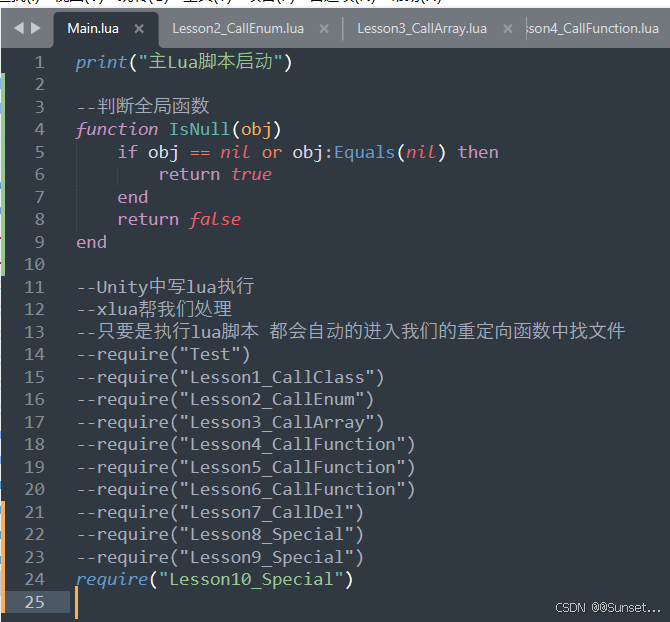
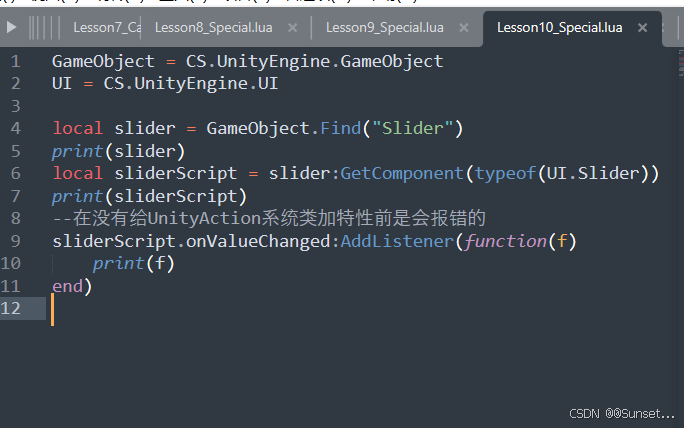
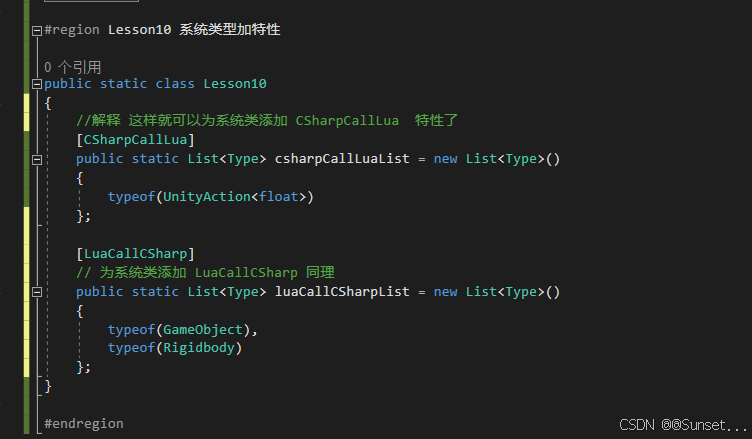
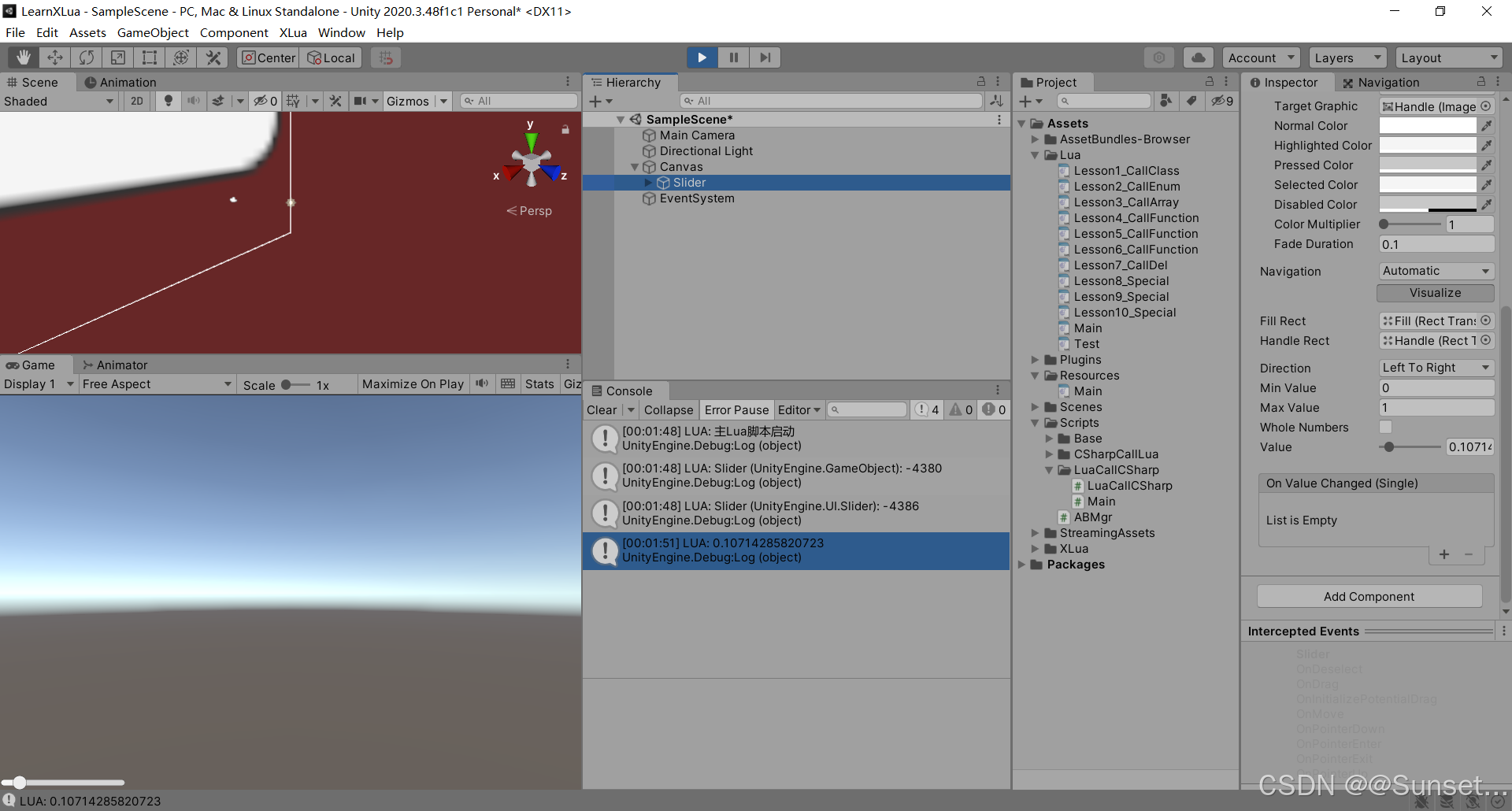
11.协程
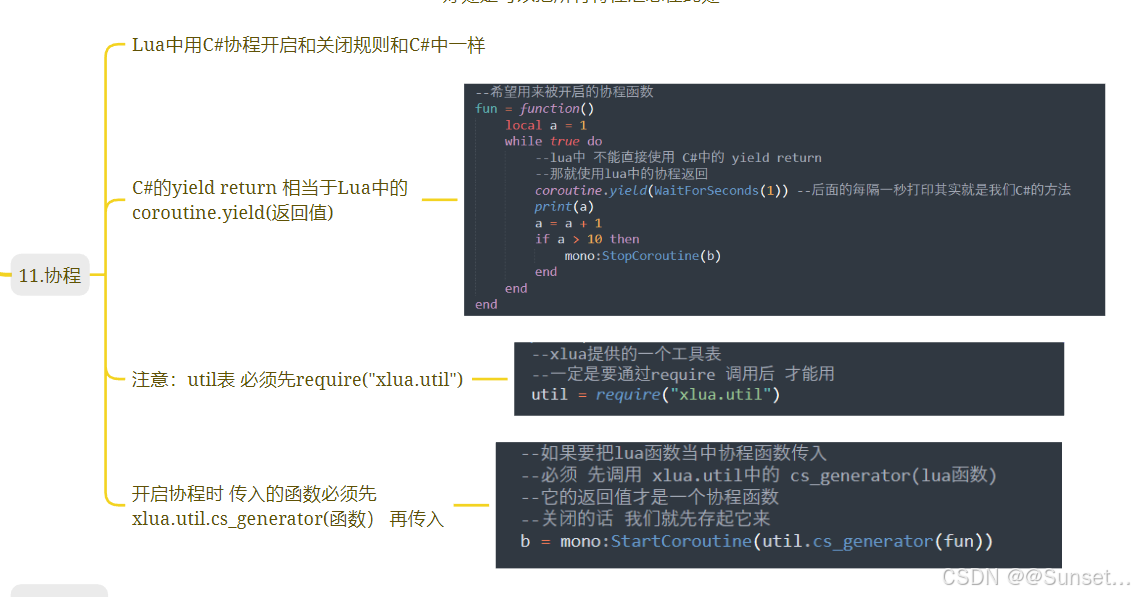
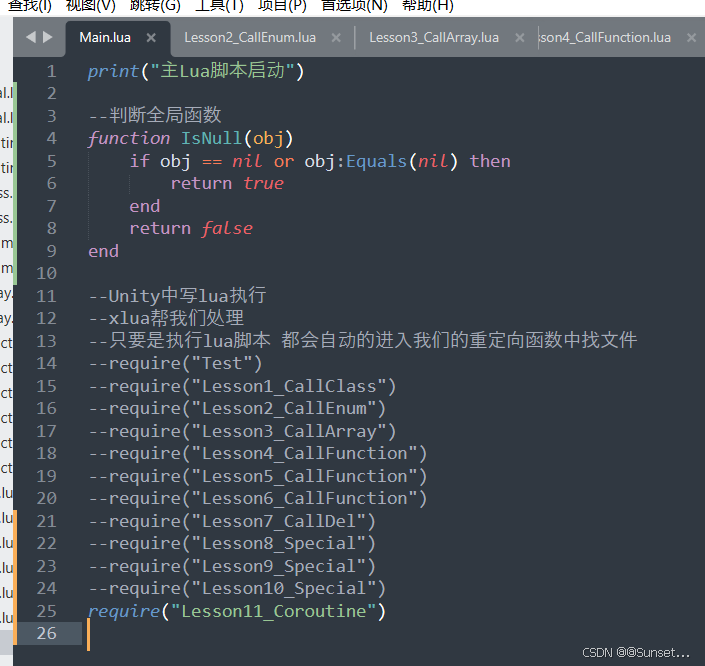
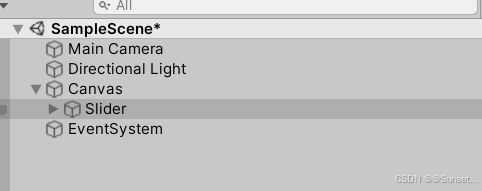
Lua
print("************Lua调用C# 协程 相关知识点**************")
--xlua提供的一个工具表
--一定是要通过require 调用后 才能用
util = require("xlua.util")
--C#中协程启动都是通过继承了Mono的类 通过里面的启动函数StartCoroutine
GameObject = CS.UnityEngine.GameObject
WaitForSeconds = CS.UnityEngine.WaitForSeconds
--在场景中新建一个空物体 然后挂一个脚本上去 脚本继承momo使用它来开启协程
local obj = GameObject("Coroutine")
local mono = obj:AddComponent(typeof(CS.LuaCallCSharp))
--希望用来被开启的协程函数
fun = function()
local a = 1
while true do
--lua中 不能直接使用 C#中的 yield return
--那就使用lua中的协程返回
coroutine.yield(WaitForSeconds(1)) --后面的每隔一秒打印其实就是我们C#的方法
print(a)
a = a + 1
if a > 10 then
mono:StopCoroutine(b)
end
end
end
--我们不能直接将 lua函数传入到C#开启协程中!!!
--mono:StartCoroutine(fun)
--如果要把lua函数当中协程函数传入
--必须 先调用 xlua.util中的 cs_generator(lua函数)
--它的返回值才是一个协程函数
--关闭的话 我们就先存起它来
b = mono:StartCoroutine(util.cs_generator(fun))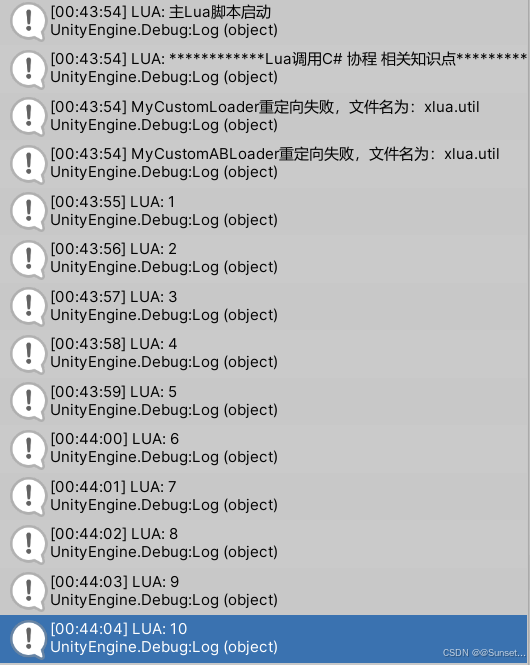
12.泛型函数
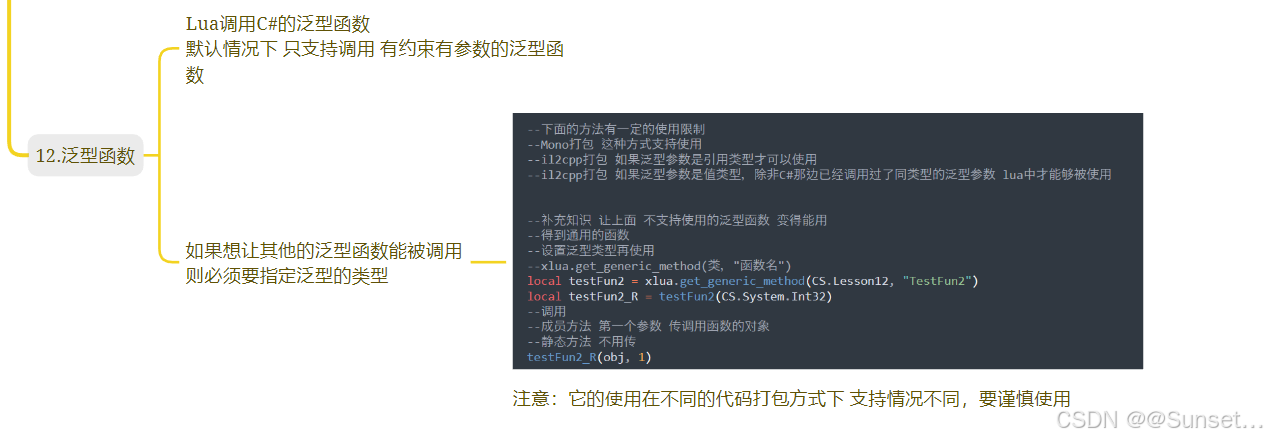
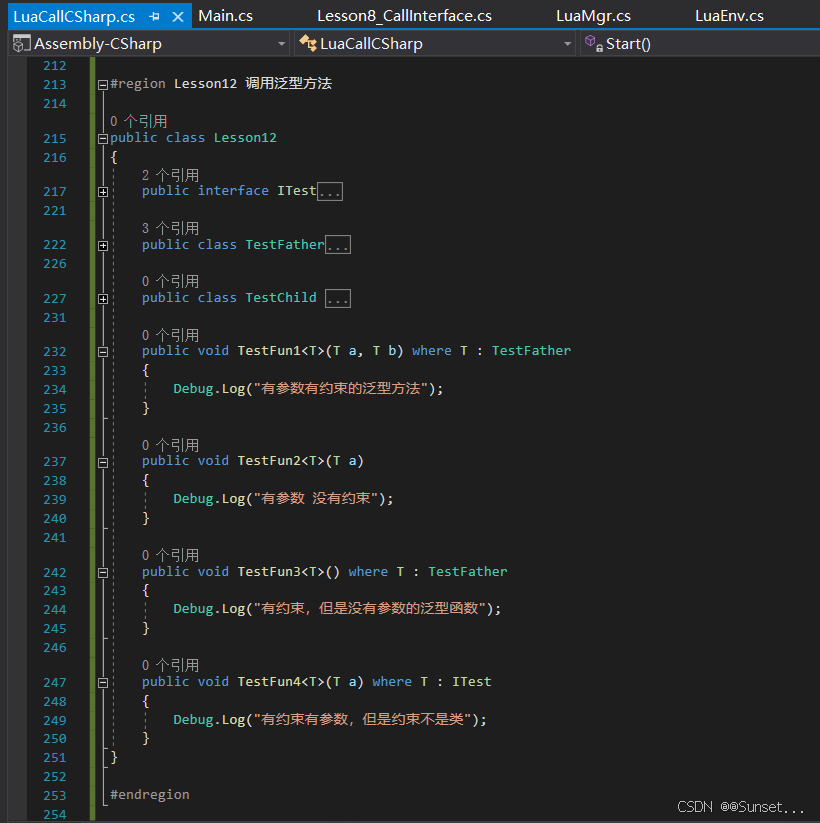
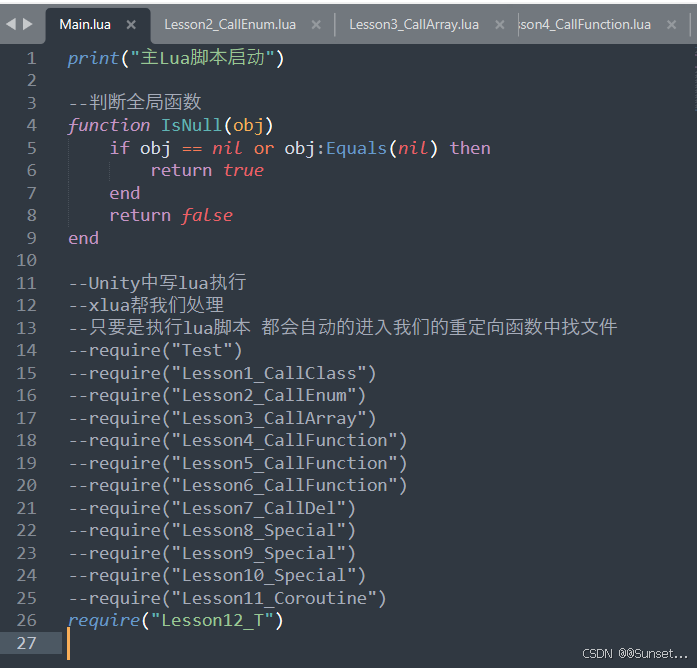
Lua
print("**************Lua调用C# 泛型函数相关知识点***************")
local obj = CS.Lesson12()
local child = CS.Lesson12.TestChild()
local father = CS.Lesson12.TestFather()
--支持有约束有参数的泛型函数
obj:TestFun1(child, fater)
obj:TestFun1(father, child)
--lua中不支持 没有约束的泛型函数
--obj:TestFun2(child) -- 会报错
--lua中不支持 有约束 但是没有参数的泛型函数
--obj:TestFun3()
--lua中不支持 非class的约束 (如不支持 接口约束)
--obj:TestFun4()
--下面的方法有一定的使用限制
--Mono打包 这种方式支持使用
--il2cpp打包 如果泛型参数是引用类型才可以使用
--il2cpp打包 如果泛型参数是值类型,除非C#那边已经调用过了同类型的泛型参数 lua中才能够被使用
--补充知识 让上面 不支持使用的泛型函数 变得能用
--得到通用的函数
--设置泛型类型再使用
--xlua.get_generic_method(类,"函数名")
local testFun2 = xlua.get_generic_method(CS.Lesson12, "TestFun2")
local testFun2_R = testFun2(CS.System.Int32)
--调用
--成员方法 第一个参数 传调用函数的对象
--静态方法 不用传
testFun2_R(obj, 1)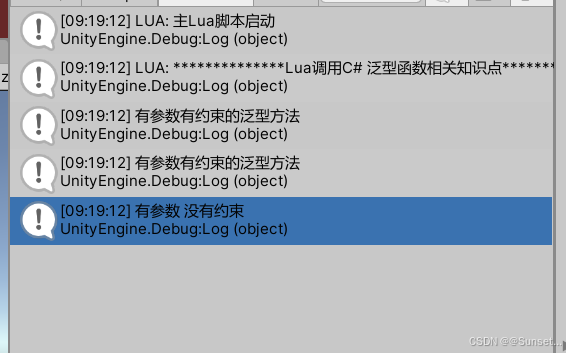
完结:接xLua背包小实践